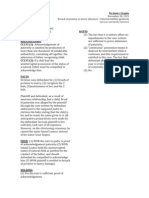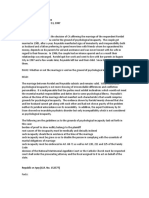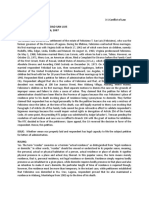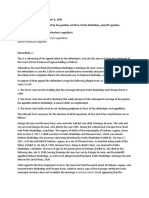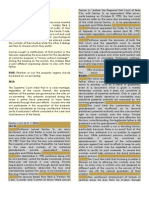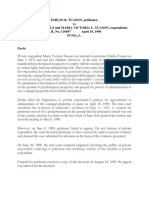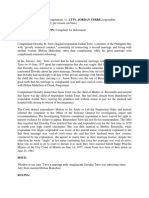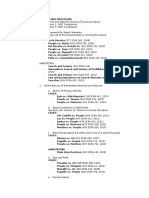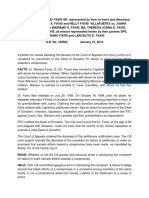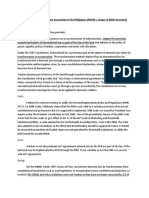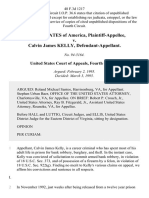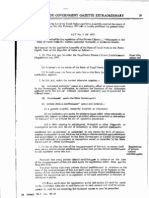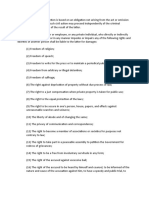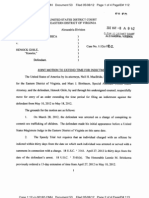Civil Law Case Digests
Civil Law Case Digests
Uploaded by
Bebejho Llamas-JulianCopyright:
Available Formats
Civil Law Case Digests
Civil Law Case Digests
Uploaded by
Bebejho Llamas-JulianCopyright
Available Formats
Share this document
Did you find this document useful?
Is this content inappropriate?
Copyright:
Available Formats
Civil Law Case Digests
Civil Law Case Digests
Uploaded by
Bebejho Llamas-JulianCopyright:
Available Formats
No.
1 2 3 4 5 6 7 8 9 10 11 12 13 14 15 16 17 18 19 20 21 22 23 24 25 26 27 28 29 30 31 32 33 34
DATE Januray 4, 1995 April 10, 1996 July 12,1996 July 31, 1996 February 13, 1997 December 8, 1999 April 12, 2000 October 19, 2000 February 9, 2001 April 17, 2001 November 26, 2002 January 29, 2004 March 4, 2004 October 4, 2004 March 10, 2005 March 31, 2005 September 21, 2005 March 10, 2006 March 31, 2006 July 17, 2006 February 7, 2007 April 13, 2007 August 2, 2007 June 27, 2008 August 26, 2008 November 7, 2008 December 16, 2008 February 13, 2009 March 31, 2009 June 5, 2009 June 9, 2009 August 14, 2009 May 26, 2009 April 15, 2010
G.R. No. 112019 G.R. No. 116607 G.R. No. 167206 G.R. No. 122749 G.R. No. 108763 G.R. No. 126010 G.R. No. 127623 G.R. No. 136490 G.R. No. 109975 G.R. No. 136921 G.R. No. 143376 G.R. No. 151867 G.R. No. 145370 G.R. NO. 158896 G.R. No. 155800 G.R. No. 127358 G.R. No. 152577 G.R. No. 155800 G.R. No. 139676 G.R. No. 162368 G.R. No. 141917 G.R. No. 162049 G.R. No. 147824 G.R. No. 166662 G.R. No. 179620 G.R. No. 155635 G.R. No. 179922 G.R. No. 161793 G.R. No. 166562 G.R. No. 150677 G.R. No. 165424 G.R. No. 166738 G.R. No. 180668 G.R. No. 168796
CASE TITLE LEOUEL SANTOS v. COURT OF APPEALS and SANTOS TUASON v. COURT OF APPEALS JAIME VILLALON v. MA.CORAZON VILLALON VALDEZ v. REGIONAL TRIAL COURT REPUBLIC OF THE PHILIPPINES v. COURT OF APPEALS and RORIDEL OLAVIANO MOLINA LUCITA ESTRELLA HERNANDEZ v. COURT OF APPEALS and MARIO C. HERNANDEZ FILIPINA Y. SY v. COURT OF APPEALS, REGIONAL TRIAL COURT, SAN FERNANDO, PAMPANGA,BRANCH XLI, and FERNANDO SY, BRENDA B. MARCOS v. WILSON G. MARCOS REPUBLIC v. DAGDAG PESCA v. PESCA LENI O. CHOA v. ALFONSO C. OCHOA DAVID B. DEDEL v. COURT OF APPEALS and SHARON L. CORPUZ-DEDEL ANCHETA v. ANCHETA SIAYNGCO v. SIAYNGCO ANTONIO v. REYES NOEL BUENAVENTURA v. COURT OF APPEALS REPUBLIC OF THE PHILIPPINES v. IYOY ANTONIO v. REYES REPUBLIC OF THE PHILIPPINES v. NORMA CUISON-MELGAR FERRARIS v. FERRARIS BERNARDINO S. ZAMORA vs. COURT OF APPEALS and NORMA MERCADO ZAMORA NARCISO S. NAVARRO, JR. v. CYNTHIA CECILIO-NAVARRO ROSA YAP-PARAS vs. JUSTO J. PARAS NAVALES v. NAVALES
MANUEL G. ALMELOR v. REGIONAL TRIAL COURT OF LAS PINAS CITY, BRANCH 254, AND LEONIDA T. ALMELOR MARIA REBECCA MAKAPUGAY BAYOT v. COURT OF APPEALS AND VICENTE MADRIGAL BAYOT JUAN DE DIOS CARLOS v. FELICIDAD SANDOVAL and TEOFILO CARLOS II
SAME
TE v. TE BENJAMIN G. TING v. CARMEN M. VELEZ-TING RENATO REYES-SO v. LORNA VALER LESTER BENJAMIN S. HALILI v. CHONA M. SANTOS-HALILI and REPUBLIC OF THE PHILIPPINES ROWENA PADILLA-RUMBAUA v. EDWARD RUMBAUA MARIETA C. AZCUETA v. REPUBLIC OF THE PHILIPPINES and COURT OF APPEALS SILVINO A. LIGERALDE v. ASCENTION A. PATALINHUG and the REPUBLIC OF THE PHILIPPINES
ANCHETA v. ANCHETA G.R. No. 145370 March 4, 2004 FACTS: Petitioner Marietta Ancheta and respondent Rodolfo Ancheta were married on March 5, 1959 and had eight children. After 33 years of marriage the petitioner left the respondent and their children. Their conjugal properties were later separated through a court-sanctioned compromise agreement where the petitioner got among others a resort in Cavite. When the husband wanted to marry again, he filed before the Regional Trial Court a petition for the declaration of nullity of his marriage with the petitioner on the ground of psychological incapacity on June 5, 1995. Although he knew that the petitioner was already residing at the resort in Cavite, he alleged in his petition that the petitioner was residing at Las Pias, Metro Manila, such that summons never reached her. Nevertheless substituted service was rendered to their son at his residence in Cavite. Petitioner was then declared in default for failing to answer the said petition. Just over a month after it was filed, the trial court granted the petition and declared the marriage of the parties void ab initio. Five years later, petitioner challenged the trial courts order declaring as void ab initio her marriage with respondent Rodolfo, citing extrinsic fraud and lack of jurisdiction over her person, among others. She alleged that the respondent lied on her real address in his petition so she never received summons on the case, hence depriving her of her right to be heard. The Court of Appeals dismissed her petition so she now comes to the Supreme Court for review on certiorari. ISSUE: Whether or not the declaration of nullity of marriage was valid? HELD: NO. The trial court and the public prosecutor defied Article 48 of the Family Code and Rule 18, Section 6 of the 1985 Rules of Court (now Rule 9, Section 3[e] of the 1997 Rules of Civil Procedure). A grant of annulment of marriage or legal separation by default is fraught with the danger of collusion, says the Court. Hence, in all cases for annulment, declaration of nullity of marriage and legal separation, the prosecuting attorney or fiscal is ordered to appear on behalf of the State for the purpose of preventing any collusion between the parties and to take care that their evidence is not fabricated or suppressed. If the defendant-spouse fails to answer the complaint, the court cannot declare him or her in default but instead, should order the prosecuting attorney to determine if collusion exists between the parties. The prosecuting attorney or fiscal may oppose the application for legal separation or annulment through the presentation of his own evidence, if in his opinion, the proof adduced is dubious and fabricated. Here, the trial court immediately received the evidence of the respondent ex-parte and rendered judgment against the petitioner without a whimper of protest from the public prosecutor who even did not challenge the motion to declare petitioner in default. The Supreme Court reiterates: The task of protecting marriage as an inviolable social institution requires vigilant and zealous participation and not mere pro-forma compliance. The protection of marriage as a sacred institution requires not just the defense of a true and genuine union but the exposure of an invalid one as well. Petition is GRANTED.
ANTONIO v. REYES G.R. No. 155800 March 10, 2005 FACTS: On December 6, 1990 Leonilo Antonio and Marie Reyes married each other. On March 8, 1993 petitioner filed for declaration of nullity based on Art. 36 alleging that the respondents pathological lying about almost anything were manifestations of her psychological incapacity. Petitioner presented two doctors who corroborated each other in declaring the respondent to be psychologically incapacitated to comply with marital obligations. Respondent denied being a pathological liar, presented another doctor who conducted a test and found her not to be psychologically incapacitated. One doctor presented by the petitioner assailed the finding of respondents doctor stating that the test is inconclusive due to its unreliability. The RTC found the evidences presented by the petitioner to warrant the grant of the decree. On respondents appeal to the CA, the church annulled the marriage due to lack of discretion of both parties. Notwithstanding the findings of the RTC and the annulment by the church the CA reversed the RTCs decision stating that the evidences of the petitioner failed to comply with the guidelines set in the Molina case (Republic vs. CA). ISSUES: 1. Is the pathological lying of a spouse manifestations of psychological incapacity? 2. Were the guidelines in the Molina case sufficiently satisfied? HELD: 1. Yes. Psychological incapacity refers to an inability to understand the obligations of marriage such actions of the wife are manifestations of this inability. 2. Yes. In understanding Article 36, the preference of the revision committee was for the judge to interpret the provision on a case-to-case basis, guided by experience, in the findings of experts and researchers in psychological disciplines, and by decisions of church tribunals which, although not binding on the civil courts, may be given persuasive effect since the provision was taken from Canon Law." Also, Molina is not set in stone the interpretation of Article 36 relies heavily on a case-to-case perception.
NOEL BUENAVENTURA v. Court of Appeals G.R. No. 127358, March 31, 2005 FACTS: July 12 1992, Noel Buenaventura filed a petition for the declaration of nullity of marriage on the ground that he and his wife were psychologically incapacitated. The Regional Trial Court in its decision declared the marriage entered into between petitioner and respondent is void ab initio. The court ordered the liquidation of the assets of the conjugal partnership property; ordered petitioner a regular support in favor of his son in the amount of 15,000 monthly, subject to modification as the necessity arises, and awarded the care and custody of the minor to his mother. Petitioner appealed before the Court of Appeals and while the appeal was pending, the Court of Appeals, upon respondents motion issued a resolution increasing the support pendants like to P20, 000. The Court of Appeals dismissal petitioner appeal for lack of merit and affirmed in to the RTC decision. Petitioner motion for reconsideration was denied, hence this petition. ISSUE: Whether or not co-ownership is applicable to valid marriage. HELD: The general rule applies, which is in case a marriage is declared void ab initio, the property regime applicable to be liquidated, partitioned and distributed is that of equal co-ownership. Since the properties ordered to be distributed by the court were there, both by the Regional Trial Court and the Court of Appeals, to have been acquired during the union of the parties, the same would be covered by the co-ownership. No fruits of a separate property of one of the parties appear to have been included or involved in said distribution.
LENI O. CHOA v ALFONSO C. OCHOA G.R. No. 143376, November 26, 2002 FACTS: Leni and Alfonso were married on March 15, 1981. Two children were born out of their marriage, Cheryl Lynne and Albryan. After 12 years, on October 27, 1993, Alfonso filed an annulment of his marriage to the Regional Trial Court, Negros Occidental Branch 51. November 8, 1993, Alfonso changes his petition to declaration of nullity due to psychological incapacity. After 5 years of trial, February 20, 1998, Alfonso submitted his Formal of Exhibits. Leni filed a Motion to Dismiss (Demurrer to Evidence). The RTC denied the Motion to Dismiss dated December 2, 1998 and the Motion for Reconsideration dated March 22, 1999. The case reached the Court of Appeals and eventually the Supreme Court. Alfonso presented insufficient evidence to prove Lenis incapacity. The grounds of Alfonso are Lenis lack of attention to their children, does not help in the household chores, and immaturity. The medical doctor who testified during the proceedings mentioned that the spouses had an incompatibility which results to a defect in their marriage and not psychological incapacity of one of the spouses. ISSUE: Whether or not Leni O. Choa is psychologically incapacitated HELD: Marriage is still valid. . Reasons should be grave, with juridical antecedence and incurable. The illness must be shown as downright incapacity or inability, not a refusal, neglect or difficulty.
REPUBLIC OF THE PHILIPPINES v. IYOY G.R. No. 152577 September 21, 2005 FACTS: The case is a petition for review by the RP represented by the Office of the Solicitor General on certiorari praying for the reversal of the decision of the CA dated July 30, 2001 affirming the judgment of the RTC declaring the marriage of Crasus L. Iyoy (respondent) and Ada Rosal-Iyoy null and void based on Article 36. On December 16, 1961 Crasus Iyoy and Ada Rosal-Iyoy married each other, they had 5 children. In 1984, Fely went to the US, in the same year she sent letters to Crasus asking him to sign divorce papers. In 1985, Crasus learned that Fely married an American and had a child. Fely went back to the Philippines on several occasions, during one she attended the marriage of one of her children in which she used her husbands last name as hers in the invitation. On March 25, 1997, Crasus filed a complaint for declaration of nullity alleging that Felys acts brought danger and dishonor to the family and were manifestations of her psychological incapacity. Crasus submitted his testimony, the certification of the recording of their marriage contract, and the invitation where Fely used her new husbands last name as evidences. Fely denied the claims and asserted that Crasus was a drunkard, womanizer, had no job, and that since 1988 she was already an American citizen and not covered by our laws. The RTC found the evidences sufficient and granted the decree; it was affirmed in the CA. ISSUE: Does abandonment and sexual infidelity per se constitute psychological incapacity? HELD: The evidences presented by the respondent fail to establish psychological incapacity. Furthermore, Article 36 contemplates downright incapacity or inability to take cognizance of and to assume the basic marital obligations; not a mere refusal, neglect or difficulty, much less, ill will, on the part of the errant spouse. Irreconcilable differences, conflicting personalities, emotional immaturity and irresponsibility, physical abuse, habitual alcoholism, sexual infidelity or perversion, and abandonment, by themselves, also do not warrant a finding of psychological incapacity under the said Article. Finally, Article 36 is not to be confused with a divorce law that cuts the marital bond at the time the causes therefore manifest themselves. It refers to a serious psychological illness afflicting a party even before the celebration of marriage. It is a malady so grave and so permanent as to deprive one of awareness of the duties and responsibilities of the matrimonial bond one is about to assume.
PESCA v. PESCA APRIL 17, 2001 FACTS: Petitioner Lorna G. Pesca and respondent Zosimo A. Pesca first met sometime in 1975 while on board an interisland vessel bound for Bacolod City. After a whirlwind courtship, they got married on 03 March 1975. They did not live together as petitioner was still a student in college and respondent, a seaman, had to leave the country on board an oceangoing vessel barely a month after the marriage. Six months later, the young couple established their residence in Quezon City until they were able to build their own house in Caloocan City where they finally resided. It was blissful marriage for the couple during the two months of the year that they could stay together - when respondent was on vacation. The union begot four children, 19-year old Ruhem, 17-year old Rez, 11-year old Ryan, and 9-year old Richie. It started in 1988, petitioner said, when she noticed that respondent surprisingly showed signs of "psychological incapacity" to perform his marital covenant. His "true color" of being an emotionally immature and irresponsible husband became apparent. He was cruel, violent and a habitual drinker. At one time, he chased petitioner with a loaded shotgun and threatened to kill her in the presence of the children. The children themselves were not spared from physical violence. Finally, on 19 November 1992, petitioner and her children left the conjugal abode. Two months later, petitioner decided to forgive respondent, and she returned home to give him a chance to change. But, to her dismay, things did not so turn out as expected. Indeed, matters became worse. Petitioner filed a complaint with the barangay authorities, and a case was filed against respondent for slight physical injuries. He was convicted by the Metropolitan Trial Court of Caloocan City and sentenced to eleven days of imprisonment. Petitioner and her children left the conjugal home for good and stayed with her sister. Petitioner sued respondent before the Regional Trial Court for the declaration of nullity of their marriage invoking psychological incapacity. Petitioner likewise sought the custody of her minor children and prayed for support pendente lite. The Court of Appeals reversed the decision of the trial court and declared the marriage between petitioner and respondent valid and subsisting. Petitioner, in her plea to this Court, would have the decision of the Court of Appeals reversed on the thesis that the doctrine enunciated in Santos vs. Court of Appeals, promulgated on 14 January 1995, as well as the guidelines set out in Republic vs. Court of Appeals and Molina, promulgated on 13 February 1997, should have no retroactive application and, on the assumption that the Molina ruling could be applied retroactively, the guidelines therein outlined should be taken to be merely advisory and not mandatory in nature. In any case, petitioner argues, the application of the Santos and Molina dicta should warrant only a remand of the case to the trial court for further proceedings and not its dismissal. ISSUE: Whether or not psychological incapacity is present in this case. HELD: The phrase "psychological incapacity" borrowed from Canon law, is an entirely novel provision in our statute books, and, until the relatively recent enactment of the Family Code, the concept has escaped jurisprudential attention. At all events, petitioner has utterly failed, both in her allegations in the complaint and in her evidence, to make out a case of psychological incapacity on the part of respondent, let alone at the time of solemnization of the contract, so as to warrant a declaration of nullity of the marriage. Emotional immaturity and irresponsibility, invoked by her, cannot be equated with psychological incapacity. The Court reiterates its reminder that marriage is an inviolable social institution and the foundation of the family6that the State cherishes and protects. While the Court commiserates with petitioner in her unhappy marital relationship with respondent, totally terminating that relationship, however, may not necessarily be the fitting denouement to it. In these cases, the law has not quite given up, neither should we. Petition is DENIED.
JAIME VILLALON v. MA.CORAZON VILLALON G.R No. 167206 July 12,1996 FACTS: This is a Civil case filed on July 12,1996 by the petitioner Jaime F. Villalon for the annulment of his marriage to Respondent Ma. Corazon N. Villalon before the Regional Trial Court of Pasig City. The petitioner cited his psychological incapacity which he claimed existed even prior to his marriage with the respondent. His psychological incapacity is about a disorder called Narcissistic Histrionic Personality Disorder with Casanova complex. The disorder is a pervasive maladaptation in terms of interpersonal and occupational functioning with main symptoms of grand ideation about oneself, self centeredness, thinking he is unique and wanting to always be the one followed. Likewise, a person with Casanova Complex exhibits habitual adulterous behavior and goes from one relationship to another. The RTC declared the marriage between the petitioner and respondent celebrated on April 22.1978 as null and void ab initio on the ground of psychological incapacity on the part of the petitioner pursuant to Article 36 of the Family Code. The respondent filed an appeal from the decision of the Regional Trial Court. On March 23,2004, the Court of Appeals rendered a decision that reversed and set aside the decision dated November 12, 2001 and a new judgment entered dismissing the petitioners petition for lack of merit. The petitioner filed a motion for reconsideration of the Appellate courts decision which was denied in order. Thus, petitioner took this recourse under Rule 45 of the Rules of Court, asserting that the Court of Appeals erred in finding that he failed to prove his psychological incapacity under Article 36 of the Family Code. The petition has no merit. ISSUE: Is marital infidelity in at least two occasions a grave psychological disorder which rendered the petitioner incapable of performing his spousal and parental obligations? HELD: In Santos Vs. Court of Appeals, the court held that psychological incapacity as a ground for declaration of nullity of a marriage should refer to no less than a mental incapacity that causes a party to be truly in cognitive of the basic marital covenants that concomitantly must be assumed and discharged by parties to the marriage which, as so expressed by Article 68 of the Family Code, include their mutual obligations to live together, observe love, respect and fidelity and render help and support. There is hardly any doubt that the intendment of the law has been to confine the meaning of psychological incapacity to the most serious cases of personality disorders clearly demonstrative of an utter insensitivity or inability to give meaning and significance to the marriage. Although the petitioner suffered from Narcissistic Histrionic Personality Disorder with Casanova Complex even before the marriage and thus had the tendency to cheat on his wife, such conclusion was not sufficiently backed by concrete evidence showing that petitioner indeed had several affairs and finds it difficult to be faithful. Except for petitioners general claim that on certain occasions he had two girlfriends at the same time, no details or explanation were given of such circumstances that would demonstrate petitioners inability to be faithful to the respondent. Moreover, the Supreme Court is not convinced that petitioner is a serial or habitual adulterer, as he wants the court to believe. As stated by the respondent, the petitioner had only two instances of infidelity for the past 13 years of their marriage which contradicted the statement of Dr. Dayan that the person suffering from Casanova Complex umps from one relationship to another. Also, the evidence reveals that the petitioner was a good husband most of the time when he was living with the respondent, a loving father to his children as well as a good provider.
NARCISO S. NAVARRO, JR. v. CYNTHIA CECILIO-NAVARRO G.R. No. 162049 April 13, 2007 FACTS: On January 8, 2003 of the Court of Appeals in CA-G.R. CV No. 65677, reversing the Regional Trial Courts declaration of nullity of the marriage of petitioner and respondent. Likewise assailed is the Court of Appeals Resolution dated February 4, 2004 denying reconsideration. Narciso Navarro, Jr. with the Regional Trial Court of Manila, Branch 37, he sought the declaration of nullity of his marriage to respondent. Petitioner and respondent were college sweethearts. At the time they got married, both in civil and church ceremonies, they were awaiting their first child. Since petitioner was still a medical student, while respondent was a student of pharmacy, they lived with petitioners parents, on whom they were financially dependent. Eventually, their union bore four children. He filed the petition for nullification of their marriage when he found out their eldest daughter had been made pregnant by a man whom respondent hired to follow him. She concluded that respondent was also psychologically incapacitated to perform the marital obligations because she knew, from the start, that her husband was going to be a doctor, yet she did not give him the support and understanding that was expected of a doctors wife. For the respondents part, respondent refused to submit to the psychiatric examination asked by the petitioner, but said she would do so only when her defense requires it. She averred that she had no marital problems, not until petitioner had an illicit affair with a certain Dr. Lucila Posadas. Petitioner denied the affair. Respondent narrated that early 1984, she caught petitioner and Lucila inside the Harana Motel in Sta. Mesa where a confrontation ensued. After the incident, petitioner seldom went home until he permanently left his family sometime in 1986. On August 21, 1998, the trial court held that petitioner and respondent were both psychologically incapacitated to perform their marital obligations. The marriage between the parties is (sic) dated June 2, 1973 is hereby declared null and void. ISSUES: 1) Is the conclusion of the Court of Appeals that the lower court (RTC) erred in finding the parties (petitioner and respondent) both psychologically incapacitated under Article 36 of The Family Code correct or not? 2) Is the conclusion of the Honorable Court of Appeals that the evidence failed to show that the parties (petitioner and respondent) were completely unable to discharge the essential obligations of marriage correct or not? HELD: 1) The Honorable Court of Appeals is correct, Article 36 of the Family Code states that, a marriage contracted by any party who, at the time of the celebration, was psychologically incapacitated to comply with the essential marital obligations of marriage, shall likewise be void even if such incapacity becomes manifest only after its solemnization. Psychological incapacity required by Art. 36 must be characterized by (a) gravity, (b) juridical antecedence, and (c) incurability. Psychological incapacity should refer to no less than a mental (not physical) incapacity that causes a party to be truly in cognitive of the basic marital covenants that concomitantly must be assumed and discharged by the parties to the marriage. These include the obligations to live together, observe mutual love, respect and fidelity, and render mutual help and support. 2) The Honorable Court of Appeals is correct, petitioner failed to show that grave and incurable incapacity, on the part of both spouses, existed at the time of the celebration of the marriage. Their bickering and arguments even before their marriage and respondents scandalous outbursts in public, at most, show their immaturity, and immaturity does not constitute psychological incapacity. Thus so far, both petitioner and respondent have not shown proof of a natal or supervening disabling factor, an adverse integral element in their personality structure that effectively incapacitates them from accepting and complying with the obligations essential to marriage.
ROSA YAP-PARAS vs. JUSTO J. PARAS G.R. No. 147824 August 2, 2007 FACTS: On May 21, 1964, petitioner Rosa Yap married respondent Justo J. Paras in Bindoy, Negros Oriental. They begot four (4) children, namely: Raoul (deceased), Cindy Rose (deceased), Dahlia, and Reuel. Twenty-nine (29) years thereafter, or on May 27, 1993, Rosa filed with the Regional Trial Court (RTC), Branch 31, Dumaguete City, a complaint for annulment of her marriage with Justo, under Article 36 of the Family Code, docketed as Civil Case No. 10613. She alleged that Justo is psychologically incapacitated to exercise the essential obligations of marriage as shown by the following circumstances: (a) he dissipated her business assets and forged her signature in one mortgage transaction; (b) he lived with a concubine and sired a child with her; (c) he did not give financial support to his children; and (d) he has been remiss in his duties both as a husband and as a father. She met Justo in 1961 in Bindoy. She was then a student of San Carlos University, Cebu City. He courted her, frequently spending time at her "Botica." Eventually, in 1964, convinced that he loved her, she agreed to marry him. Their wedding was considered one of the "most celebrated" marriages in Bindoy. Sometime in 1975, their daughter Cindy Rose was afflicted with leukemia. It was her family who paid for her medication. Also, in 1984, their son Raoul was electrocuted while Justo was in their rest house with his "barkadas." He did not heed her earlier advice to bring Raoul in the rest house as the latter has the habit of climbing the rooftop. To cope with the death of the children, the entire family went to the United States. However, after three months, Justo abandoned them and left for the Philippines. Upon her return to the Philippines, she was shocked to find her "Botica" and other businesses heavy in debt and he disposed without her consent a conjugal piece of land. At other times, he permitted the municipal government to take gasoline from their gas station free of charge. His act of maintaining a mistress and siring an illegitimate child was the last straw that prompted her to file the present case. She found that after leaving their conjugal house in 1988, Justo lived with Jocelyn Ching. Their cohabitation resulted in the birth of a baby girl, Cyndee Rose, obviously named after her (Rosa) and Justos deceased daughter Cindy Rose Paras. He also denied forging her signature in one mortgage transaction. He maintained that he did not dispose of a conjugal property and that he and Rosa personally signed the renewal of a sugar crop loan before the banks authorized employee. He did not abandon his family in the United States. For his part, he was granted only three (3) months leave as municipal mayor of Bindoy, thus, he immediately returned to the Philippines. He spent for his childrens education. At first, he resented supporting them because he was just starting his law practice and besides, their conjugal assets were more than enough to provide for their needs. He admitted though that there were times he failed to give them financial support because of his lack of income. What caused the inevitable family break-out was Rosas act of embarrassing him during his birthday celebration in 1987. She did not prepare food for the guests. When confronted, she retorted that she has nothing to do with his birthday. This convinced him of her lack of concern. This was further aggravated when she denied his request for engine oil when his vehicle broke down in a mountainous and NPA-infested area. As to the charge of concubine, he alleged that Jocelyn Ching is not his mistress, but her secretary in his Law Office. She was impregnated by her boyfriend, a certain Grelle Leccioness. Cyndee Rose Ching Leccioness is not his daughter. After trial or on February 28, 1995, the RTC rendered a Decision upholding the validity of the marriage. It found that: (a) Justo did not abandon the conjugal home as he was forced to leave after Rosa posted guards at the gates of their house; (b) the conjugal assets were sufficient to support the family needs, thus, there was no need for Justo to shell out his limited salary; and (c) the charge of infidelity is unsubstantiated. The RTC observed that the relationship between the parties started well, negating the existence of psychological incapacity on either party at the time of the celebration of their marriage. And lastly, it ruled that there appeared to be a collusion between them as both sought the declaration of nullity of their marriage. On October 18, 2000, this Court rendered its Decision finding him guilty of falsifying Rosas signature in bank documents, immorality, and abandonment of his family. He was suspended from the practice of law, thus: the respondent is suspended from the practice of law for SIX (6) MONTHS on the charge of falsifying his wifes signature in bank documents and other related loan instruments; and for ONE (1) YEAR from the practice of law on the charges of immorality and abandonment of his own family, the penalties to be served simultaneously. Let notice of this Decision be spread in respondents record as an attorney, and notice of the same served on the Integrated Bar of the Philippines and on the Office of the Court Administrator for circulation to all the courts concerned. On December 8, 2000, the Court of Appeals affirmed the RTC Decision in the present case, holding that "the evidence of the plaintiff (Rosa) falls short of the standards required by law to decree a nullity of marriage." It ruled that Justos alleged defects or idiosyncrasies "were sufficiently explained by the evidence," Rosa contends that this Courts factual findings in A.C. No. 5333 for disbarment are conclusive on the present case. Consequently, the Court of Appeals erred in rendering contrary factual findings. Also, she argues that she filed the instant complaint sometime in May, 1993 ISSUES: 1) Whether the factual findings of this Court in A.C. No. 5333 are conclusive on the present case; 2) Whether a remand of this case to the RTC for reception of expert testimony on the root cause of Justos alleged psychological incapacity is necessary; and 3) Whether the totality of evidence in the case shows psychological incapacity on the part of Justo. HELD: 1) A reading of the Court of Appeals Decision shows that she has no reason to feel aggrieved. In fact, the appellate court even assumed that her charges "are true," but concluded that they are insufficient to declare the marriage void on the ground of psychological incapacity. Justo's alleged infidelity, failure to support his family and alleged abandonment of their family home are true, such traits are at best indicators that he is unfit to become an ideal husband and father. However, by themselves, these grounds are insufficient to declare the marriage void due to an incurable psychological incapacity. These grounds, we must emphasize, do not manifest that he was truly in cognitive of the basic marital covenants that he must assume and discharge as a married person. While they may manifest the "gravity" of his alleged psychological incapacity, they do not necessarily show incurability, such that while his acts violated the covenants of marriage, they do not necessarily show that such acts show an irreparably hopeless state of psychological incapacity which prevents him from undertaking the basic obligations of marriage in the future. 2) The root cause of the psychological incapacity must be (a) medically or clinically identified, (b) alleged in the complaint, (c) sufficiently proven by experts, and (d) clearly explained in the decision. Article 36 of the Family Code requires that the incapacity must be psychological -- not physical, although its manifestations and/or symptoms may be physical. The evidence must convince the court that the parties, or one of them, was mentally or psychically ill to such an extent that the person could not have known the obligations he was assuming, or knowing them, could not have given valid assumption thereof. Although no example of such incapacity need be given here so as not to limit the application of the provision under the principle of ejusdem generis, nevertheless such root cause must be identified as a psychological illness and its incapacitating nature fully explained. Expert evidence may be given by qualified psychiatrists and clinical psychologists. 3) ART. 36. A marriage contracted by a party who, at the time of celebration, was psychologically incapacitated to comply with the essential marital obligations of marriage shall likewise be void even if such incapacity becomes manifest only after its solemnization. psychological incapacity must be characterized by (a) gravity; (b) juridical antecedence; and (c) incurability.
BERNARDINO S. ZAMORA vs. COURT OF APPEALS and NORMA MERCADO ZAMORA G.R. No. 141917 February 7, 2007 FACTS: Petitioner and respondent were married on June 4, 1970 in Cebu City. After their marriage, they lived together at No. 50-A Gorordo Avenue, Cebu City. The union did not produce any child. In 1972, private respondent left for the United States to work as a nurse. She returned to the Philippines for a few months, and then left again in 1974. Thereafter, she made periodic visits to Cebu City until 1989, when she was already a U.S. citizen. Petitioner filed a complaint for declaration of nullity of marriage anchored on the alleged "psychological incapacity" of private respondent, as provided for under Article 36 of the Family Code. To support his position, he alleged that his wife was "horrified" by the mere thought of having children as evidenced by the fact that she had not borne petitioner a child. Furthermore, he also alleged that private respondent abandoned him by living in the United States and had in fact become an American citizen; and that throughout their marriage they lived together for not more than three years. Respondent denied that she refused to have a child. She portrayed herself as one who loves children as she is a nurse by profession and that she would from time to time borrow her husbands niece and nephews to care for them. She also faulted her husband for the breakup of their marriage, alleging that he had been unfaithful to her. He allegedly had two affairs with different women, and he begot at least three children with them. On June 22, 1995, the trial court rendered its decision. The plaintiff consented to defendants trip to the United States in 1974. She [defendant] wanted to earn money there because she wanted to help her husband build a big house at the Beverly Hills, Cebu City. The plaintiff himself admitted that he has a child, and the court is also convinced that he has two children. However, nothing in the evidence of plaintiff shows that the defendant suffered from any psychological incapacity or that she failed to comply with her essential marital obligations. There is no evidence of psychological incapacity on the part of defendant so that she could not carry out the ordinary duties required in married life. Neither has it been shown that there was an incurable defect on the part of defendant. ISSUES: 1) Whether or not the Court of Appeals misapplied facts of weight and substance affecting the result of the present case; 2) Whether or not the presentation of psychologists and/or psychiatrists is still desirable, if evidence in this case already shows the psychological incapacity of private respondent; 3) Whether or not private respondents refusal to live with petitioner under one roof for more than twenty (20) years, her refusal to bear children with petitioner, and her living a solitary life in the United States for almost three (3) decades are enough indications of psychological incapacity to comply with essential marital obligations under Article 36 of the Family Code. HELD: 1) The Courts merely said in that case that "the well-considered opinions of psychiatrists, psychologists, and persons with expertise in psychological disciplines might be helpful or even desirable." However, no expert opinion is helpful or even desirable to determine whether private respondent has been living abroad and away from her husband for many years; whether she has a child; and whether she has made her residence abroad permanent by acquiring U.S. citizenship 2) Article 36 of the Family Code provides that a marriage contracted by any party who, at the time of the celebration, was psychologically incapacitated to comply with the essential marital obligations of marriage, shall likewise be void even if such incapacity becomes manifest only after its solemnization. 3) A petition under Article 36 of the Family Code shall specifically allege the complete facts showing that either or both parties were psychologically incapacitated from complying with the essential marital obligations of marriage at the time of the celebration of marriage even if such incapacity becomes manifest only after its celebration.
LEOUEL SANTOS v. COURT OF APPEALS and SANTOS GR No. 112019 / 58 SCAD 17 January 4, 1995 FACTS: Lt. Leouel Santos married private respondent Julia Bedia on Sept. 20, 1986 in Iloilo MTC and later by church wedding. They lived with the latters parents and eventually gave birth to Leouel Santos, Jr. on July 18, 1987. The relationship turned sour when they began quarrelling over frequent interference On May 18, 1988, Julia left for the United States (US) to work as nurse despite Leouels protestations. Seven months thereafter or on January 1, 1989, she called up from the US with the promise of returning home soon, but she never did. Given the chance, Leouel went to the US for a training program He then filed with the Regional Trial Court (RTC) for the nullification of their marriage under Article 36 of the Family Code, on the ground of psychological incapacity. Summons was served by publication in a newspaper of general circulation in Negros Oriental. In her answer, Julia claimed that it was Leouel who was irresponsible and incompetent. The RTC in November ISSUE:
Whether or not the marriage may be declared a nullity pursuant to Article 36 of the Fami HELD: Article 36 cannot be taken and construed independently, but must stand in conjunction with existing precepts of laws on marriage. Thus correlated, psychological incapacity should refer no less than a mental (not physical) incapacity that causes a party to be truly in cognitive of the basic marital covenants that concomitantly must be assumed and discharged by the parties to the marriage which, as so expressed by Article 68 of the Family Code, include their mutual obligations to live together, observe love, respect and fidelity and render help and support. There is hardly any doubt that the intendment of the law has been to confine the meaning of psychological incapacity to the most serious cases of personality disorders clearly demonstrative of an utter insensitivity or inability to give meaning and The well-considered opinions of psychiatrists, psychologists and persons with expertise in psychological disciplines might be helpful or even desirable in Marriage is not just and adventure but a lifetime commitment. We should continue to be reminded that innate in our society, then enshrined in the Civil Code, and even now still indelible in Section 1 of the Family Codethe
NAVALES v. NAVALES G.R. No. 166662 June 27, 2008 FACTS: In 1986, Nilda and Reynaldo met in a local bar where Nilda was a waitress. Because of his fear that Nilda may be wed to an American, Reynaldo proposed to Nilda and they got married in 1988. Reynaldo is aware that Nilda has an illegitimate child out of wedlock. The 1st year of their marriage went well until Nilda began to work when she neglected some of her duties as a wife. She later worked as a gym instructor and according to Reynaldos allegations; her job makes her flirt with her male clients. She also drives home with other guys even though Reynaldo would be there to fetch her. She also projected herself as single. And she refused to have a child with Reynaldo because that would only destroy her figure. Reynaldo then filed a petition to have their marriage be annulled. He presented her cousin as a witness that attested that Nilda was flirting with other guys even with Reynaldos presence. Reynaldo also presented the findings of a psychologist who concluded that based on Nildas acts, Nilda is a nymphomaniac, who has a borderline personality, a social deviant, an alcoholic, and suffering from anti-social personality disorder, among others, which illnesses are incurable and are the causes of Nildas psychological incapacity to perform her marital role as wife to Reynaldo. Nilda on her part attacked Reynaldos allegations. She said that it is actually Reynaldo who is a womanizer and that in fact she has filed a case of concubine against him which was still pending. She also said that she only needs the job in order to support herself because Reynaldo is not supporting her. She also showed proof that she projected herself as a married woman and that she handles an aerobics class which is exclusive to females only. The RTC and the CA ruled in favor of Reynaldo. ISSUE: Whether the marriage between Reynaldo and Nilda is null and void on the ground of Nildas psychological incapacity. HELD: The petition must be granted because the States participation in this case is wanting. There were no other pleadings, motions, or position papers filed by the Public Prosecutor or OSG; and no controverting evidence presented by them before the judgment was rendered. And even if the SC would consider the case based on the merits, the petition would still be granted. The acts presented by Reynaldo by themselves are insufficient to establish a psychological or mental defect that is serious, incurable or grave as contemplated by Article 36 of the Family Code. Article 36 contemplates downright incapacity or inability to take cognizance of and to assume basic marital obligations. Mere difficulty, refusal or neglect in the performance of marital obligations or ill will on the part of the spouse is different from incapacity rooted on some debilitating psychological condition or illness. Indeed, irreconcilable differences, sexual infidelity or perversion, emotional immaturity and irresponsibility, and the like, do not by themselves warrant a finding of psychological incapacity under Article 36, as the same may only be due to a persons refusal or unwillingness to assume the essential obligations of marriage and not due to some psychological illness that is contemplated by said rule. The SC also finds the finding of the psychological expert to be insufficient to prove the PI of Nilda. The testimonies presented by people the expert interviewed were not concretely established as the fact as to how those people came up with their respective information was not as well shown. There is no proof as well that Nilda had had sex with different guys a condition for nymphomia. There being doubt as to Nildas PI the SC ruled that this case be resolved in favor of the validity of marriage.
REPUBLIC OF THE PHILIPPINES v. COURT OF APPEALS and RORIDEL OLAVIANO MOLINA February 13, 1997 FACTS: On April 14, 1985, plaintiff Roridel O. Molina married Reynaldo Molina which union bore a son. After a year of marriage, Reynaldo showed signs of "immaturity and irresponsibility" as a husband and a father as he preferred to spend more time with his peers and friends, depended on his parents for aid and assistance, and was never honest with his wife in regard to their finances, resulting in frequent quarrels between them. The RTC granted Roridel petition for declaration of nullity of her marriage which was affirmed by the CA. ISSUE: Do irreconcilable differences and conflicting personalities constitute psychological incapacity? HELD: There is no clear showing to us that the psychological defect spoken of is incapacity. It appears to us to be more of a "difficulty," if not outright "refusal" or "neglect" in the performance of some marital obligations Mere showing of "irreconcilable differences" and "conflicting personalities" in no wise constitutes psychological incapacity. It is not enough to prove that the parties failed to meet their responsibilities and duties as married persons; it is essential that they must be shown to be incapable of doing so, due to some psychological (not physical) illness. The evidence adduced by respondent merely showed that she and her husband could not get along with each other. There had been no showing of the gravity of the problem; neither its juridical antecedence nor its incurability. The following guidelines in the interpretation and application of Art. 36 of the Family Code are hereby handed down for the guidance of the bench and the bar: (1) The burden of proof to show the nullity of the marriage belongs to the plaintiff. Any doubt should be resolved in favor of the existence and continuation of the marriage and against its dissolution and nullity. (2) The root cause of the psychological incapacity must be (a) medically or clinically identified, (b) alleged in the complaint, (c) sufficiently proven by experts and (d) clearly explained in the decision. Article 36 of the Family Code requires that the incapacity must be psychological - not physical, although its manifestations and/or symptoms may be physical. (3)The incapacity must be proven to be existing at "the time of the celebration" of the marriage. (4) Such incapacity must also be shown to be medically or clinically permanent or incurable. Such incurability may be absolute or even relative only in regard to the other spouse, not necessarily absolutely against everyone of the same sex. (5) Such illness must be grave enough to bring about the disability of the party to assume the essential obligations of marriage. Thus, "mild characteriological peculiarities, mood changes, occasional emotional outbursts" cannot be accepted as root causes. (6) The essential marital obligations must be those embraced by Articles 68 up to 71 of the Family Code as regards the husband and wife as well as Articles 220, 221 and 225 of the same Code in regard to parents and their children. Such non-complied marital obligation(s) must also be stated in the petition, proven by evidence and included in the text of the decision. (7) Interpretations given by the National Appellate Matrimonial Tribunal of the Catholic Church in the Philippines, while not controlling or decisive, should be given great respect by our courts. It is clear that Article 36 was taken by the Family Code Revision Committee from Canon 1095 of the New Code of Canon Law, which became effective in 1983. (8) The trial court must order the prosecuting attorney or fiscal and the Solicitor General to appear as counsel for the state. No decision shall be handed down unless the Solicitor General issues a certification, which will be quoted in the decision, briefly stating therein his reasons for his agreement or opposition, as the case may be, to the petition. The assailed Decision is REVERSED and SET ASIDE.
FERRARIS v. FERRARIS July 17, 2006 FACTS: This is a resolution of the Supreme Court on the Motion for Reconsideration filed by the petitioner regarding the dismissal of her petition for declaration of nullity of her marriage to the respondent. ISSUE: How shall psychological incapacity be proven? HELD: The term "psychological incapacity" to be a ground for the nullity of marriage under Article 36 of the Family Code, refers to a serious psychological illness afflicting a party even before the celebration of the marriage. It is a malady so grave and so permanent as to deprive one of awareness of the duties and responsibilities of the matrimonial bond one is about to assume. 13 As all people may have certain quirks and idiosyncrasies, or isolated characteristics associated with certain personality disorders, there is hardly any doubt that the intendment of the law has been to confine the meaning of "psychological incapacity" to the most serious cases of personality disorders clearly demonstrative of an utter insensitivity or inability to give meaning and significance to the marriage. It is for this reason that the Court relies heavily on psychological experts for its understanding of the human personality. However, the root cause must be identified as a psychological illness and its incapacitating nature must be fully explained, which petitioner failed to convincingly demonstrate. Quite apart from being plainly self-serving, petitioners evidence showed that respondents alleged failure to perform his so-called marital obligations was not at all a manifestation of some deep-seated, grave, permanent and incurable psychological malady. To be sure, the couples relationship before the marriage and even during their brief union (for well about a year or so) was not all bad. During that relatively short period of time, petitioner was happy and contented with her life in the company of respondent. In fact, by petitioners own reckoning, respondent was a responsible and loving husband. x x x. Their problems began when petitioner started doubting respondents fidelity. It was only when they started fighting about the calls from women that respondent began to withdraw into his shell and corner, and failed to perform his so- called marital obligations. Respondent could not understand petitioners lack of trust in him and her constant naggings. He thought her suspicions irrational. Respondent could not relate to her anger, temper and jealousy. At any rate, Dr. Dayan did not explain how she arrived at her diagnosis that respondent has a mixed personality disorder called "schizoid," and why he is the "dependent and avoidant type." In fact, Dr. Dayans statement that one suffering from such mixed personality disorder is dependent on others for decision x x x lacks specificity; it seems to belong to the realm of theoretical speculation. Also, Dr. Dayans information that respondent had extramarital affairs was supplied by the petitioner herself. Notably, when asked as to the root cause of respondents alleged psychological incapacity, Dr. Dayans answer was vague, evasive and inconclusive. She replied that such disorder "can be part of his family upbringing" x x x. She stated that there was a history of respondents parents having difficulties in their relationship. But this input on the supposed problematic history of respondents parents also came from petitioner. Nor did Dr. Dayan clearly demonstrate that there was really "a natal or supervening disabling factor" on the part of respondent, or an "adverse integral element" in respondents character that effectively incapacitated him from accepting, and, thereby complying with, the essential marital obligations. We find respondents alleged mixed personality disorder, the "leaving-the-house" attitude whenever they quarreled, the violent tendencies during epileptic attacks, the sexual infidelity, the abandonment and lack of support, and his preference to spend more time with his band mates than his family, are not rooted on some debilitating psychological condition but a mere refusal or unwillingness to assume the essential obligations of marriage. While petitioners marriage with the respondent failed and appears to be without hope of reconciliation, the remedy however is not always to have it declared void ab initio on the ground of psychological incapacity. An unsatisfactory marriage, however, is not a null and void marriage. No less than the Constitution recognizes the sanctity of marriage and the unity of the family; it decrees marriage as legally "inviolable" and protects it from dissolution at the whim of the parties. Both the family and marriage are to be "protected" by the state. Petition dismissed with finality.
ANTONIO v. REYES March 10, 2006 FACTS: Petitioner filed a petition to have his marriage to respondent declared null and void. He anchored his petition for nullity on Article 36 of the Family Code alleging that respondent was psychologically incapacitated to comply with the essential obligations of marriage. He asserted that respondents incapacity existed at the time their marriage was celebrated and still subsists up to the present. As manifestations of respondents alleged psychological incapacity, petitioner claimed that respondent persistently lied about herself, the people around her, her occupation, income, educational attainment and other events or things, to wit: (1) She concealed the fact that she previously gave birth to an illegitimate son, and instead introduced the boy to petitioner as the adopted child of her family. She only confessed the truth about the boys parentage when petitioner learned about it from other sources after their marriage. (2) She fabricated a story that her brother-in-law, Edwin David, attempted to rape and kill her when in fact, no such incident occurred. (3) She misrepresented herself as a psychiatrist to her obstetrician, Dr. Consuelo Gardiner, and told some of her friends that she graduated with a degree in psychology, when she was neither. (4) She claimed to be a singer or a free-lance voice talent affiliated with Black gold Recording Company (Black gold); yet, not a single member of her family ever witnessed her alleged singing activities with the group. In the same vein, she postulated that a luncheon show was held at the Philippine Village Hotel in her honor and even presented an invitation to that effect but petitioner discovered per certification by the Director of Sales of said hotel that no such occasion had taken place. (5) She invented friends named Babes Santos and Via Marquez, and under those names, sent lengthy letters to petitioner claiming to be from Black gold and touting her as the number one moneymaker in the commercial industry worth P2 million. Petitioner later found out that respondent herself was the one who wrote and sent the letters to him when she admitted the truth in one of their quarrels. He likewise realized that Babes Santos and Via Marquez were only figments of her imagination when he discovered they were not known in or connected with Black gold. (6) She represented herself as a person of greater means, thus, she altered her pay slip to make it appear that she earned a higher income. She bought a sala set from a public market but told petitioner that she acquired it from a famous furniture dealer. She spent lavishly on unnecessary items and ended up borrowing money from other people on false pretexts. (7) She exhibited insecurities and jealousies over him to the extent of calling up his officemates to monitor his whereabouts. When he could no longer take her unusual behavior, he separated from her in August 1991. He tried to attempt a reconciliation but since her behavior did not change, he finally left her for good in November 1991. In support of his petition, petitioner presented Dr. Dante Herrera Abcede (Dr. Abcede), a psychiatrist, and Dr. Arnulfo V. Lopez (Dr. Lopez), a clinical psychologist, who stated, based on the tests they conducted, that petitioner was essentially a normal, introspective, shy and conservative type of person. On the other hand, they observed that respondents persistent and constant lying to petitioner was abnormal or pathological. It undermined the basic relationship that should be based on love, trust and respect. They further asserted that respondents extreme jealousy was also pathological. It reached the point of paranoia since there was no actual basis for her to suspect that petitioner was having an affair with another woman. They concluded based on the foregoing that respondent was psychologically incapacitated to perform her essential marital obligations. After trial, the lower court gave credence to petitioners evidence and held that respondents propensity to lying about almost anythingher occupation, state of health, singing abilities and her income, among othershad been duly established. According to the trial court, respondents fantastic ability to invent and fabricate stories and personalities enabled her to live in a world of make-believe. This made her psychologically incapacitated as it rendered her incapable of giving meaning and significance to her marriage. The trial court thus declared the marriage between petitioner and respondent null and void. ISSUE: Whether or not there is sufficient basis/showing of psychological incapacity as to render the marriage null and void. HELD: It should be noted that the lies attributed to respondent were not adopted as false pretenses in order to induce petitioner into marriage. More disturbingly, they indicate a failure on the part of respondent to distinguish truth from fiction, or at least abide by the truth. Petitioners witnesses and the trial court were emphatic on respondents inveterate proclivity to telling lies and the pathologic nature of her mistruths, which according to them, were revelatory of respondents inability to understand and perform the essential obligations of marriage. Indeed, a person unable to distinguish between fantasy and reality would similarly be unable to comprehend the legal nature of the marital bond, much less its psychic meaning, and the corresponding obligations attached to marriage, including parenting. One unable to adhere to reality cannot be expected to adhere as well to any legal or emotional commitments. From the totality of the evidence, can it be definitively concluded that respondents condition is incurable? It would seem, at least, that respondents psychosis is quite grave. But the requirement that psychological incapacity must be shown to be medically or clinically permanent or incurable is one that necessarily cannot be divined without expert opinion. Clearly in this case, there was no categorical averment from the expert witnesses that respondents psychological incapacity was curable or incurable. From the totality of the evidence, however, we are sufficiently convinced that the incurability of respondents psychological incapacity has been established by the petitioner.
SIAYNGCO v. SIAYNGCO October 4, 2004 FACTS: Petitioner Juanita Carating-Siayngco and respondent Manuel were married at civil rites on 27 June 1973 and before the Catholic Church on August 11 1973. After discovering that they could not have a child of their own, the couple decided to adopt a baby boy in 1977, who they named Jeremy. On 25 September 1997, or after twenty-four (24) years of married life together, respondent Manuel filed for the declaration of its nullity on the ground of psychological incapacity of petitioner Juanita. He alleged that all throughout their marriage, his wife exhibited an over domineering and selfish attitude towards him. In her Answer, petitioner Juanita alleged that respondent Manuel is still living with her at their conjugal home in Malolos, Bulacan; that he invented malicious stories against her so that he could be free to marry his paramour. The trial court denied respondent Manuels petition for declaration of nullity of his marriage to petitioner Juanita. The Court of Appeals reversed the RTC decision, relying mainly on the psychiatric evaluation of Dr. Garcia finding both Manuel and Juanita psychologically incapacitated. Hence, this petition for review on certiorari of the decision of the Court of Appeals. ISSUE: Whether or not both Manuel and Juanita are psychologically incapacitated. HELD: The presumption is always in favor of the validity of marriage. Semper praesumitur pro matrimonio. In the case at bar, respondent Manuel failed to prove that his wifes lack of respect for him, her jealousies and obsession with cleanliness, her outbursts and her controlling nature, and her inability to endear herself to his parents are grave psychological maladies that paralyze her from complying with the essential obligations of marriage. Neither is there any showing that these defects were already present at the inception of the marriage or that they are incurable. In fact, the psychiatrist reported that petitioner was psychologically capacitated to comply with the basic and essential obligations of marriage. The psychological report of respondent Manuels witness, Dr. Garcia, showed that the root cause of petitioner Juanitas behavior is traceable not from the inception of their marriage as required by law but from her experiences during the marriage, e.g., her in-laws disapproval of her as they wanted their son to enter the priesthood, her husbands philandering, admitted no less by him, and her inability to conceive. An unsatisfactory marriage, however, is not a null and void marriage. Mere showing of irreconcilable differences and conflicting personalities in no wise constitutes psychological incapacity. As we stated in Marcos v. Marcos: Article 36 of the Family Code, we stress, is not to be confused with a divorce law that cuts the marital bond at the time the causes therefore manifests themselves. It refers to a serious psychological illness afflicting a party even before the celebration of the marriage. It is a malady so grave and so permanent as to deprive one of awareness of the duties and responsibilities of the matrimonial bond one is about to assume. Petition for review is hereby GRANTED. The Decision of the Court of Appeals is hereby REVERSED and SET ASIDE. The Decision of the Regional Trial Court is reinstated and given full force and effect.
DAVID B. DEDEL v. COURT OF APPEALS and SHARON L. CORPUZ-DEDEL January 29, 2004 FACTS: David Dedel and Sharon Corpuz were married on September 28, 1996 and May 20,1967 in a civil and church wedding, respectively. They had four children. David instituted a case for the nullity of their marriage on account of Sharons psychological incapacity to perform basic marital obligations. He claimed that Sharon had extra-marital affairs with several men including a dentist in the AFP, a lieutenant in the Presidential Security Command, and a Jordanian national. Despite the treatment by a clinical psychiatrist, Sharon did not stop her illicit relationship with the Jordanian, whom she married and with whom she had two children. When the Jordanian national left the country, Sharon returned to David bringing along her two children by the Jordanian national. David accepted her back and even considered the illegitimate children as his own. However, Sharon abandoned David to join the Jordanian national with her two children. Since then, Sharon would only return to the country on special occasions. Dra. Natividad Dayan testified that she conducted a psychological evaluation of David and found him to be conscientious, hardworking, diligent, a perfectionist who wants all tasks and projects completed up to the final detail and who exerts his best in whatever he does. On the other hand, Dra. Dayan declared that Sharon was suffering from AntiSocial Personality Disorder exhibited by her blatant display of infidelity; that she committed several indiscretions and had no capacity for remorse even bringing with her the two children of the Jordanian to live with David. Such immaturity and irresponsibility in handling the marriage like her repeated acts of infidelity and abandonment of her family are indications of the said disorder amounting to psychological incapacity to perform the essential obligations of marriage. The trial court declared their marriage null and void on the ground of the psychological incapacity of Sharon to perform the essential obligations of marriage. While the Court of Appeals set aside the trial courts judgment and ordered the dismissal of the petition. Davids motion for reconsideration was denied. Hence, he appealed to the Supreme Court. ISSUE: Whether or not Sharons infidelity is equivalent to psychologically incapacity. HELD: No. Sharons infidelity is not equivalent to psychologically incapacity. As held in Santos vs. Court of Appeals, psychological incapacity should refer to no less than a mental, not physical, incapacity that causes a party to be truly in cognitive of the basic marital covenants that concomitantly must be assumed and discharged by the parties to the marriage which as so expressed in Article 68 of the Family Code, include their mutual obligations to live together, observe love, respect and fidelity and render help and support. The law intended to confine the meaning of psychological incapacity to the most serious cases of personality disorders clearly demonstrative of an utter insensitivity of inability to give meaning and significance to the marriage. Sharons sexual infidelity or perversion and abandonment do not by themselves constitute psychological incapacity within the contemplation of the Family Code. Neither could her emotional immaturity and irresponsibility be equated with psychological incapacity. It must be shown that these acts are manifestations of a disordered personality, which make the respondent completely unable to discharge the essential obligations of the marital state, not merely due to her youth, immaturity or sexual promiscuity. At best, the circumstances relied upon by David are grounds for legal separation under Article 55 of the Family Code not for declaring a marriage void. The grounds for legal separation, which need not be rooted in psychological incapacity, include physical violence, moral pressure, civil interdiction, drug addiction, habitual alcoholism, sexual infidelity, abandonment, and the like. Decision affirmed. Petition denied.
BRENDA B. MARCOS v. WILSON G. MARCOS October 19, 2000 FACTS: Brenda B. Marcos married Wilson Marcos in 1982 and they had five children. Alleging that the husband failed to provide material support to the family and have resorted to physical abuse and abandonment. Brenda filed a case for the nullity of the marriage for psychological incapacity. The RTC declared the marriage null and void under Article 36 which was however reversed by the CA. ISSUES: 1. Whether personal medical or psychological examination of the respondent by a physician is a requirement for a declaration of psychological incapacity. 2. Whether or not the totality of evidence presented in this case show psychological incapacity. HELD: Psychological incapacity, as a ground for declaring the nullity of a marriage, may be established by the totality of evidence presented. There is no requirement, however that the respondent should be examined by a physician or a psychologist as a condition since qua non for such declaration. Although this Court is sufficiently convinced that respondent failed to provide material support to the family and may have resorted to physical abuse and abandonment, the totality of his acts does not lead to a conclusion of psychological incapacity on his part. There is absolutely no showing that his "defects" were already present at the inception of the marriage or that they are incurable. Verily, the behavior of respondent can be attributed to the fact that he had lost his job and was not gainfully employed for a period of more than six years. It was during this period that he became intermittently drunk, failed to give material and moral support, and even left the family home. Thus, his alleged psychological illness was traced only to said period and not to the inception of the marriage. Equally important, there is no evidence showing that his condition is incurable, especially now that he is gainfully employed as a taxi driver. In sum, this Court cannot declare the dissolution of the marriage for failure of petitioner to show that the alleged psychological incapacity is characterized by gravity, juridical antecedence and incurability; and for her failure to observe the guidelines outlined in Molina.
REPUBLIC v. DAGDAG 351 SCRA 425 FACTS: Erlinda Matias and Avelino Dagdag contracted marriage on September 7, 1975. They begot two children. A week after the wedding, Avelino started leaving his family without explanation. He would from time to time, disappear and suddenly reappear for a few months. He was always drunk and would forced his wife to submit to sexual intercourse and inflict physical injuries on her if she refused. On October 1993, he left his family and was never heard from him again. Erlinda was forced to work and learned that Avelino was imprisoned and that he escaped from jail. Erlinda filed a petition for declaration of nullity of marriage on the grounds of psychological incapacity. Since Avelino could not be located, summons was served by publication. Upon trial, Erlinda presented Virginia Dagdag who attested to the psychological incapacity of Avelino. The trial court rendered a decision in favor of respondent without waiting for the prosecutors manifestation. The Court of Appeals affirmed trials court decision. ISSUE: Whether or not Avelino Dagdag is psychologically incapacitated. HELD: The court contented that Erlinda failed to comply with guideline No. 2 which requires that the root cause of psychological incapacity must be medically or clinically identified and sufficiently proven by experts, since no psychiatrist or medical doctor testified as to the alleged psychological incapacity of her husband. Furthermore, the allegation that the husband is a fugitive from justice was not sufficiently proven. The investigating prosecutor was likewise not given an opportunity to present controversy evidence since the trial courts decision was prematurely rendered.
FILIPINA Y. SY v. COURT OF APPEALS, REGIONAL TRIAL COURT, SAN FERNANDO, PAMPANGA,BRANCH XLI, and FERNANDO SY, G.R. No. 127623 April 12, 2000 FACTS: On August 4, 1992, Filipina filed a petition for the declaration of absolute nullity of her marriage to Fernando on the ground of psychological incapacity. Lower court and CA denied the petition. ISSUES: 1. Whether or not the marriage between petitioner and private respondent is void from the beginning for lack of a marriage license at the time of the ceremony; and 2. Whether or not private respondent is psychologically incapacitated at the time of said marriage celebration to warrant a declaration of its absolute nullity. HELD: Marriage is void due to lack of marriage license. The issue on the psychological incapacity of Fernando Sy was rendered moot and academic. Habitual alcoholism, refusal to live with her without fault on her part, choosing to live with his mistress instead; and refusal to have sex and performing the marital act only to satisfy himself does not constitute psychological incapacity. It falls short of the quantum of evidence. The general rule is that you do not assign an error in judgment, the appellate court will not tackle that unassigned error or issue. But in this case, even if the issue was unassigned, it was so obvious from the record that there was no marriage license which proved that the marriage is void because there was no marriage license.
TE v. TE G.R. No. 161793 / 579 SCRA 193 February 13, 2009 FACTS: Petitioner Edward Kenneth Ngo and respondent Rowena Ong Gutierrez Yu-Te first met in a gathering organized by the Filipino-Chinese association in their college. Later on, the petitioner decided to court Rowena. In March 1996, three months after their first meeting, Rowena asked Edward to elope. At first, the petitioner refused citing that he was young and jobless. Eventually, Rowenas persistence made him relent. They left Manila and sailed to Cebu in the same month. During their time in Cebu, their resources were eventually depleted by their expenses. In April 1996, they went back to Manila. Rowena proceeded to her uncles house and Edward went back to his parents home. At this point in time, Rowena threatened to commit suicide. As a result, Edward agreed to stay with Rowena at her uncles house. On April 23, 1996, Rowenas uncle brought the two to a court to get married. They continued to stay at her uncles house. Edward was not allowed to go out unaccompanied, just like prisoner. Her uncle also showed Edward his guns warned the latter not to leave Rowena. Edward, with the advice of his brother, told Rowena that they should stay at his parents home and live with them. On the other hand, Rowena had a different idea. She suggested that he should get his inheritance so they can live on their own. Edward talked to his father about this, but the patriarch got mad and told Edward that he would be disinherited and insisted that Edward must go home. After a month, Edward was able to escape from the house of Rowenas uncle and stayed with his parents. His family hid him from Rowena and her family, especially when they asked for him through the telephone. In 1996, Edward was able to talk to Rowena and again proposed that they should live with his parents. At this point, she said that it was better for them to live separate lives. They then parted ways. On January 18, 2000, Edward filed a petition before the Regional Trial Court of Quezon City for the annulment of his marriage to Rowena on the basis of latters psychological incapacity. The clinical psychologist who examined the petitioner found both parties psychologically incapacitated. Evidently, both parties have impulsively taken marriage for granted as they are still unaware of themselves. The petitioner is extremely introvert to the point of weakening their relationship by his weak behavioral disposition. She, on the other hand, is extremely exploitative and aggressive so as to be unlawful, insincere and undoubtedly uncaring in her strides toward convenience. Apparently, she is suffering the grave, severe, and incurable presence of Narcissistic and Antisocial Personality Disorder that started since childhood and only manifested during marriage. Both parties displayed psychological incapacities that made marriage a big mistake for them to take. The trial court, on July 30, 2001, rendered its decision declaring the marriage of the parties null and void on the ground that both parties were psychologically incapacitated to comply with the essential marital obligations. The Republic, represented by the Office of the Solicitor General, timely filed its notice of appeal in the Court of Appeals. On review, the appellate court reversed and set aside the trial courts ruling. It ruled that petitioner failed to prove the psychological incapacity of respondent. The clinical psychologist did not personally examine respondent, and relied only on the information provided by petitioner. Further, the psychological incapacity was not shown to be attended by gravity, juridical antecedence and incurability. In sum, the evidence adduced fell short of the requirements stated in Republic v. Court of Appeals and Molina needed for the declaration of nullity of the marriage under Article 36 of the Family Code. Dissatisfied, petitioner filed before Supreme Court the instant petition for review on certiorari . On June 15, 2005, the Court gave due course to the petition and required the parties to submit their respective memoranda. ISSUE: Whether or not, the declaration of nullity of marriage due to psychological incapacity should be restricted on the requirements stated in Molina. HELD: No, it was intended by the law makers not to give any examples of psychological incapacity for fear that by so doing, it might limit the applicability of the provision under the principle of ejusdem generis . They desired that the courts should interpret the provision on a case-to-case basis; guided by experience, the findings of experts and researchers in psychological disciplines, and by decisions of church tribunals which, although not binding on the civil courts, may be given persuasive effect since the provision itself was taken from the Canon Law. The law is then so designed as to allow some resiliency in its application. The Supreme Court emphasized the resiliency with which the concept should be applied and the case-to-case basis by which the provision should be interpreted, as so intended by its framers, had, somehow, been rendered ineffectual by the imposition of a set of strict standards in Molina . Furthermore, it claimed that in hindsight, it may have been inappropriate for the Court to impose a rigid set of rules, as the one in Molina , in resolving all cases of psychological incapacity. However, the Supreme Court stressed that it is not suggesting the abandonment of Molina in this case. It simply declared that, as aptly stated by Justice Dante O. Tinga in Antonio v. Reyes , there is a need to emphasize other perspectives as well which should govern the disposition of petitions for declaration of nullity under Article 36. Therefore, each case must be judged, not on the basis of a priori assumptions, predilections or generalizations but according to its own facts. It reemphasized that courts should interpret the provision on a case-to-case basis; guided by experience, the findings of experts and researchers in psychological disciplines, and by decisions of church tribunals.
RENATO REYES-SO v. LORNA VALER G.R. No. 150677 June 5, 2009 FACTS: The petitioner and the respondent live-in together without the benefit of marriage since 1973 and they bore three children. On December 10, 1991, they exchanged their marital vows at the Caloocan City Hall. On May 14, 1996, the petitioner filed with the Regional Trial Court of Makati a petition for the declaration of nullity of marriage with the respondent. On November 8, 1999, the Regional Trial Court nullified the marriage due to psychological incapacity to comply with the essential marital obligations of marriage on the part of the respondent. The Republic of the Philippines appealed the decision of the Regional Trial Court to the Court of Appeals due to failure of the petitioner to prove the respondent being psychologically incapacitated. On July 4, 2001, the Court of Appeals reversed and set aside the decision of the Regional Trial Court. The petitioner then appealed the decision of the Court of Appeals to the Supreme Court praying for the reinstatement of the decision of the Regional Trial Court. On June 5, 2009, the Supreme Court denied the petition due to lack of merit and holds that no sufficient basis existed to annul the marriage pursuant to Article 36 of the Family Code. Therefore, the Supreme Court affirmed the decision of the Court of Appeals preserving the marriage between the petitioner and the respondent. ISSUE: Whether or not the evidence presented in this case was a total meaning of Article 36 of the Family Code, enough to nullify the marriage between the petitioner and the respondent. HELD: No, because Article 36 contemplates downright incapacity or inability to take cognizance of and to assume basic marital obligations. Mere difficulty, refusal, or neglect in the performance of marital obligations is different from incapacity rooted on some debilitating psychological condition or illness. A person's refusal or unwillingness to assume the essential obligations of marriage and not some psychological illness that is contemplated by this rule.
LESTER BENJAMIN S. HALILI v. CHONA M. SANTOS-HALILI and REPUBLIC OF THE PHILIPPINES G.R. No. 165424 June 9, 2009 FACTS: Petitioner and the respondent married on July 4,1995 at the City Hall of Manila. After the wedding, they continued to live with their respective parents and never lived together but maintained their relationship nonetheless. Petitioner filed in the Regional Trial Court of Pasig City a petition for the nullity of their marriage on the ground that the respondent was psychologically incapacitated to fulfill his essential marital obligations. He also pointed out that they never lived together as husband and wife and they never consummated their marriage. On April 17, 1998, the Regional Trial Court declared that the marriage between the petitioner and the respondent is null and void. The respondents appealed to the Court of Appeals, on January 26, 2004. The Court of Appeals reversed and set aside the decision of the Regional Trial Court on the ground that totality of the evidence presented failed to established petitioner's psychological incapacity. The petitioner appealed to the Supreme Court for reconsideration. On June 9, 2009, the Supreme Court set aside the decision of the Court of Appeals and reinstated the decision of the Regional Trial Court. ISSUE: Whether or not the totality of evidence presented is sufficient to prove that the petitioner suffered from psychological incapacity which effectively prevented him to comply from his essential marital obligations. HELD: Yes, because ultimately the psychologist sufficiently established that petitioner had psychological condition that was grave and incurable and had a deeply rooted cause and that already existed at the time of the celebration of his marriage to the respondent.
MARIETA C. AZCUETA v. REPUBLIC OF THE PHILIPPINES and COURT OF APPEALS G. R. No. 180668 May 26, 2009 FACTS: On July 24, 1993, petitioner Marieta Azcueta married Rodolfo Azcueta at Antipolo City. They ceased to live together as husband and wife in 1997. On March 2, 2002, petitioner filed with the Regional Trial Court of Antipolo City a petition for declaration of absolute nullity of marriage under Article 36 of the Family Code of the Philippines. On July 19, 2005, the regional Trial Court, Branch 72 declared the marriage null and void abinitio pursuant to Article 36 of the Family Code. The solicitor-general appealed the Regional Trial Court's decision objecting that the psychiatric report of the psychologist was based solely on the information given by the petitioner and not based on personal examination of Rodolfo. On August 31, 2007, the Court of Appeals reversed the decision of the Regional Trial Court, thus making the marriage between the petitioner and Rodolfo VALID. The petitioner filed to the Supreme Court a petition for review on certiorari assailing the decision of the Court of Appeals. On May 26, 2009, the Supreme Court granted the petition and reinstated the decision of the Regional Trial Court declaring the marriage annulled. ISSUE: Whether or not the totality of the evidence presented is adequate to sustain a finding that Rodolfo is psychologically incapacitated to comply with his essential marital obligations. HELD: Yes, because the petitioner successfully discharged her burdens to prove the psychological incapacity of his husband. Furthermore, the root cause of Rodolfo's psychological incapacity has been medically or clinically identified, sufficiently proven by expert's testimony, and clearly explained in the trial court's decision. Moreover, Rodolfo's psychological incapacity was established to have clearly existed at the time and even before the celebration of their marriage, it has also been shown to be sufficiently grave, so as to render him unable ta assume the essential obligations of marriage.
ROWENA PADILLA-RUMBAUA v. EDWARD RUMBAUA G.R No. 166738 August 14, 2009 FACTS: On February 23, 1993, Rowena Padilla and Edward Rumbaua were married in City of Manila. However, they never lived together in one habitat because their marriage was a secret to Edward's family. In 1995, Edward's mother died and he blamed Rowena being responsible for her death associating it to the discovering of their "secret marriage." Rowena filed for nullity of their marriage due to psychological incapacity in the Regional Trial Court of Manila. The Court nullified the marriage in its decision on April 19, 2002. The Republic of the Philippines appealed the decision to the Court of Appeals due to prematurity, as it was rend despite the absence of required certifications from the Solicitor General. On June 25, 2004, the Court of Appeals reversed the decision of the Regional Trial Court due to prematurity thus denied the nullification of the parties' marriage. Rowena, not happy with the decision of the Court of Appeals, filed a petition to the Supreme Court praying for the Court of Appeal's decision be set aside and regional Trials Court's decision be reinstated. The Supreme Court on August 14, 2009, deny the petition for lack of merit, thus affirmed the decision of the Court of Appeals dated June 25, 2004. ISSUE: Whether or not, the psychologist was able to prove that the respondent is indeed psychologically incapacitated according to Article 36 of the Family Code of the Philippines. HELD: No, the psychologist did not have enough proof because in her psychiatric report, she did not mention the cause of the respondent's so-called "narcissistic personality disorder", she failed to explain to the court an insight into the respondent's development years. Furthermore, she did not explain why she came to the conclusion that the respondent's incapacity is "deep seated and incurable", when Article 36 of the Family Code of the Philippines states that evidence presented must show that the incapacitated party was mentally or physically ill so that he or she could not have known the marital obligations assumed in marriage.
TUASON v. COURT OF APPEALS G.R. No. 116607 April 10, 1996 FACTS: In 1989, private respondent Maria Victoria L. Tuason filed with the Regional Trial Court, branch 149 of Makati a petition for annulment or declaration of nullity of her marriage to petitioner Emilio Tuason. In her complaint Maria alleged that she and Emilio were married on June 3, 1972 and as a result begot two children and at the time of the marriage Emilio Tuason was already Psychologically Incapacitated to comply with his essential marital obligation which became manifest afterward and resulted in violent fights between them. Maria also alleged that Emilio is a drug user and a womanizer that in 1984 he left the conjugal home and cohabitated with three women in succession. After he left the conjugal dwelling he gave minimal support to the family and even refused to pay for the tuition of his children compelling Maria to accept donations and dole-outs from her family and friends. Emilio likewise become spendrift and abused his administration of the conjugal partnership. ISSUES: 1.) whether or not Marias claim that Emilio was already psychologically incapacitated at the time of the marriage and becomes manifest only after their marriage is a valid ground for the nullity of their marriage. 2.) whether or not Emilio Tuasons claim that he was deprived of due process is correct. HELD: 1.) Yes. Emilio Tuason failed to present witnesses or evidences that would prove his innocence that led to the courts decision to declare their marriage void under Article 36 of the Family Code based on the evidences presented by Maria Tuason. 2.) No because his failure to inform or to notify the court about his confinement and medical treatment therefrom is negligence which is not excusable that led the court to deny his petition.
VALDEZ v. REGIONAL TRIAL COURT G.R. No. 122749 July 31, 1996 FACTS: Antonio Valdez and Consuelo Gomez were married on January 5, 1971 as a result begot five children. In a petition dated June 22, 1992, Valdez sought the declaration of nullity of the marriage pursuant to Article 36 of the Family Code. The petition was filed in the Regional Trial Court of Quezon City, Branch 102. After hearing the parties following the joinder of the issues, the trial court rendered its decision on the 29th day of July 1994 granted the petition to declare their marriage null and void under Article 36 of the Family Code on the ground of their mutual psychological incapacity to comply with their essential marital obligations. ISSUE: 1.) Whether or not the court applied the correct law in the liquidation of their properties. HELD: The court applied the law correctly. In a void marriage, regardless of the cause, the property relations of the parties during the period of cohabitation is governed by the provisions of Article 147 or 148 such as the case may be of the family code. Article 147 is just a remake of article 144 of the civil code as interpreted and so applied in previous cases. Wherefore, the questioned orders dated May 5, 1995 and October 30, 1995, of the trial court are affirmed.
BENJAMIN G. TING v. CARMEN M. VELEZ-TING G.R. No. 166562 March 31, 2009 FACTS: On October 21, 1993, after being married for more than 18 years to petitioner and while their youngest child was only two years old, Carmen filed a verified petition before the RTC of Cebu City praying for the declaration of nullity of their marriage based on Article 36 of the Family Code. She claimed that Benjamin suffered from psychological incapacity even at the time of the celebration of their marriage, which, however, only became manifest thereafter. On January 9, 1998, the lower court rendered its decision declaring the marriage between petitioner and respondent null and void. The RTC gave credence to Dr. Oates findings and the admissions made by Benjamin in the course of his deposition, and found him to be psychologically incapacitated to comply with the essential obligations of marriage. On October 19, 2000, the petitioner appealed to the CA, reversing the trial courts ruling. ISSUE: Whether or not the CA correctly ruled that the requirement of proof of psychological incapacity for the declaration of absolute nullity of marriage based on Article 36 of the Family Code has been liberalized. HELD: No, by the very nature of cases involving the application of Article 36, it is logical and understandable to give weight to the expert opinions furnished by psychologists regarding the psychological temperament of parties in order to determine the root cause, juridical antecedence, gravity and incurability of the psychological incapacity. However, such opinions, while highly advisable, are not conditions sine qua non in granting petitions for declaration of nullity of marriage. At best, courts must treat such opinions as decisive but not indispensable evidence in determining the merits of a given case. In fact, if the totality of evidence presented is enough to sustain a finding of psychological incapacity, then actual medical or psychological examination of the person concerned need not be resorted to. The trial court, as in any other given case presented before it, must always base its decision not solely on the expert opinions furnished by the parties but also on the totality of evidence adduced in the course of the proceedings. But where, as in this case, the parties had the full opportunity to present professional and expert opinions of psychiatrists tracing the root cause, gravity and incurability of a partys alleged psychological incapacity, then such expert opinion should be presented and, accordingly, be weighed by the court in deciding whether to grant a petition for nullity of marriage. The petition for review on certiorari is GRANTED.
MANUEL G. ALMELOR v. REGIONAL TRIAL COURT OF LAS PINAS CITY, BRANCH 254, AND LEONIDA T. ALMELOR G.R. No. 179620 August 26, 2008 FACTS: On January 29, 1989, Manuel Almelor and Leonida Almelor got married at the Manila Cathedral. They had three children. Manuel and Leonida are both medical practitioners, an anesthesiologist and a pediatrician, respectively. Prior to their union, they met each other in 1981 at San Lazaro Hospital where they worked as medical students. At that time, she regarded Manuel as a very thoughtful person who got along well with other people. They soon became sweethearts. Three years after, they got married. After eleven (11) years of marriage, Leonida filed a petition with the RTC in Las Pinas City to annul their marriage on the ground that Manuel was psychologically incapacitated to perform his marital obligations. Leonida averred that Manuel's kind and gentle demeanor did not last long. Frequent quarrels of the couple rooted from the harsh disciplinary measure of Manuel to their children. She also contended that Manuel was up to this time, he was still attached to his mother and dependent on her especially on decision-making. On November 25, 2005, RTC rendered judgment granting the petition for annulment, stating that the marriage between Manuel and Leonida was void from the beginning on the ground of psychological incapacity. On July 31, 2007, CA affirmed in toto the decision of the trial court. ISSUE: Whether or not the decision of the lower court was correct in upholding the marriage between Leonida and Manuel null and void on the ground of psychological incapacity. HELD: The Supreme Court ruled that the decision of the lower court is not correct. The trial court declared that Leonida's petition for nullity had "no basis at all because the supporting grounds relied upon can not legally make a case under Article 36 of the Family Code." It went further by citing Republic v. Molina : Indeed, mere allegations of conflicting personalities, irreconcilable differences, incessant quarrels and/or beatings, unpredictable mood swings, infidelities, vices, abandonment, and difficulty, neglect, or failure in the performance of some marital obligations do not suffice to establish psychological incapacity. Even assuming, ex gratia argumenti , that Manuel is a homosexual, the lower court cannot appreciate it as a ground to annul his marriage with Leonida. The law is clear - a marriage may be annulled when the consent of either party was obtained by fraud, such as concealment of homosexuality. Nowhere in the said decision was it proven by preponderance of evidence that Manuel was a homosexual at the onset of his marriage and that he deliberately hid such fact to his wife. It is the concealment of homosexuality, and not homosexuality per se , that vitiates the consent of the innocent party. Such concealment presupposes bad faith and intent to defraud the other party in giving consent to the marriage. Consent is an essential requisite of a valid marriage. To be valid, it must be freely given by both parties. An allegation of vitiated consent must be proven by preponderance of evidence. The Family Code has enumerated an exclusive list of circumstances constituting fraud. Homosexuality per se is not among those cited, but its concealment. To reiterate, homosexuality per se is only a ground for legal separation. It is its concealment that serves as a valid ground to annul a marriage. Concealment in this case is not simply a blanket denial, but one that is constitutive of fraud. It is this fundamental element that respondent failed to prove. Verily, the lower court committed grave abuse of discretion, not only by solely taking into account petitioner's homosexuality per se and not its concealment, but by declaring the marriage void from its existence. This Court is mindful of the constitutional policy to protect and strengthen the family as the basic autonomous social institution and marriage as the foundation of the family. The State and the public have vital interest in the maintenance and preservation of these social institutions against desecration by fabricated evidence. Thus, any doubt should be resolved in favor of the validity of marriage.
MARIA REBECCA MAKAPUGAY BAYOT v. COURT OF APPEALS AND VICENTE MADRIGAL BAYOT November 7, 2008 FACTS: Vicente and Rebecca were married on April 20, 1979 in Sanctuario de San Jose, Greenhills, Mandaluyong City. On November 27, 1982 in San Francisco, California, Rebecca gave birth to Marie Josephine Alexandra or Alix. From then on, Vicente and Rebecca's marital relationship seemed to have soured as the latter, sometime in 1996, initiated divorce proceedings in the Dominican Republic. Before the Court of the First Instance of the Judicial District of Santo Domingo, Rebecca personally appeared, while Vicente was duly represented by counsel. On February 22, 1996, the Dominican court issued Civil Decree No. 362/96. On March 21, 2001, Rebecca filed another petition, this time before the Muntinlupa City RTC, for declaration of absolute nullity of marriage on the ground of Vicente's alleged psychological incapacity. On June 8, 2001, Vicente filed a Motion to Dismiss. To the motion to dismiss, Rebecca interposed an opposition, insisting on her Filipino citizenship, as affirmed by the Department of Justice (DOJ), and that, therefore, there is no valid divorce to speak of. RTC ruled against Vicente. CA ruled in favor of Rebecca stating that the marriage between the spouses was already dissolved upon the grant of divorce since Rebecca was an American citizen when she applied for such decree. ISSUE: Whether or not the divorce decree obtained by Rebecca in Guam was sufficient to dissolve the marriage bond between them. Thus, the application for the declaration of nullity of marriage before the RTC was no longer needed. HELD: There can be no serious dispute that Rebecca, at the time she applied for and obtained her divorce from Vicente, was an American citizen and remains to be one, absent proof of an effective repudiation of such citizenship. The following are compelling circumstances indicative of her American citizenship: (1) she was born in Agaa, Guam, USA; (2) the principle of jus soli is followed in this American territory granting American citizenship to those who are born there; and (3) she was, and may still be, a holder of an American passport. And as aptly found by the CA, Rebecca had consistently professed, asserted, and represented herself as an American citizen, particularly: (1) during her marriage as shown in the marriage certificate; (2) in the birth certificate of Alix; and (3) when she secured the divorce from the Dominican Republic. First , at the time of the divorce, as above elucidated, Rebecca was still to be recognized, assuming for argument that she was in fact later recognized, as a Filipino citizen, but represented herself in public documents as an American citizen. At the very least, she chose, before, during, and shortly after her divorce, her American citizenship to govern her marital relationship. Second , she secured personally said divorce as an American citizen, as is evident in the text of the Civil Decrees. Third , being an American citizen, Rebecca was bound by the national laws of the United States of America, a country which allows divorce. Fourth , the property relations of Vicente and Rebecca were properly adjudicated through their Agreement executed on December 14, 1996 after Civil Decree No. 362/96 was rendered on February 22, 1996, and duly affirmed by Civil Decree No. 406/97 issued on March 4, 1997. Veritably, the foreign divorce secured by Rebecca was valid. It is essential that there should be an opportunity to challenge the foreign judgment, in order for the court in this jurisdiction to properly determine its efficacy. In this jurisdiction, our Rules of Court clearly provide that with respect to actions in personam , as distinguished from actions in rem , a foreign judgment merely constitutes prima facie evidence of the justness of the claim of a party and, as such, is subject to proof to the contrary. As the records show, Rebecca, assisted by counsel, personally secured the foreign divorce while Vicente was duly represented by his counsel, a certain Dr. Alejandro Torrens, in said proceedings. As things stand, the foreign divorce decrees rendered and issued by the Dominican Republic court are valid and, consequently, bind both Rebecca and Vicente. Finally, the fact that Rebecca may have been duly recognized as a Filipino citizen by force of the June 8, 2000 affirmation by Secretary of Justice Tuquero of the October 6, 1995 Bureau Order of Recognition will not, standing alone, work to nullify or invalidate the foreign divorce secured by Rebecca as an American citizen on February 22, 1996. For as we stressed at the outset, in determining whether or not a divorce secured abroad would come within the pale of the country's policy against absolute divorce, the reckoning point is the citizenship of the parties at the time a valid divorce is obtained.
SILVINO A. LIGERALDE v. ASCENTION A. PATALINHUG and the REPUBLIC OF THE PHILIPPINES G. R. No. 168796 April 15, 2010 FACTS: This is a petition to review the decision of the RTC of Dagupan City which was reversed by the decision of the Court of Appeals on November 30, 2004 declaring the marriage between Silvino Ligeralde (petitioner) and May Ascension Patalinghug (respondent) as null and void. On October 3, 1984, Silvino and May got married and they had four children. During the marriage however, May had several signs of marital behaviors such as immaturity, negligence, infidelity and irresponsibility. She even admitted to have slept with her Palestinian boyfriend. But even then, Silvinos deep love for her, their children and the commitment of May prevented him from leaving her. Reconciliation took place. A few months later, May was back again to her old style. She confessed that she had no more love for him. They then lived separately. Silvino came to believe that his wife is psychologically incapacitated to comply with the essential marital obligations. Prior to the filing of the complaint against the respondent, Silvino had consulted Dr. Tina Nicdao-Basilio for psychological evaluation. The psychologist certified that May was psychologically incapacitated to perform her essential marital obligations; that the incapacity started when she was still young and became manifest after marriage and that the same was serious and incurable. This was the basis of the decision of the RTC declaring the marriage null and void on October 22, 1999. The Court of Appeals nevertheless reversed the above decision on the grounds that respondents alleged sexual infidelity, emotional immaturity and irresponsibility do not constitute psychological incapacity within the contemplation of the Family Code and that the psychologist failed to identify and prove the root cause thereof and that the incapacity was medically or clinically permanent or incurable. ISSUE: Whether or not Mays behavior constitutes psychological incapacity pursuant to article 36 of the Family Code. HELD: Article 36 of the Family Code states: A marriage contracted by any party who, at the time of the celebration, was psychologically incapacitated to comply with the essential marital obligations of marriage; shall likewise be void even if such incapacity becomes manifest only after its solemnization. Psychological incapacity required by Article 36 must be characterized by gravity, juridical antecedence and incurability. The incapacity must be grave or serious such that the party would be incapable of carrying out the ordinary duties required in marriage. It must be rooted in history of the party antedating the marriage, although the manifestations may emerge only after the marriage. It must be incurable, or, even if it were otherwise, the cure would be beyond the means of the party involved. The Court likewise laid down the guidelines in resolving petitions for declaration of nullity of marriage, based on Article 36 of the Family Code, in Republic vs. Court of Appeals. Relevant to this petition are the following: 1) The burden of proof to show the nullity of the marriage belongs to the plaintiff; 2) The root cause of the psychological incapacity must be medically or clinically identified, alleged in the complaint, sufficiently proven by experts and clearly explained in the decision 3) The incapacity must be proven to be existing at the time of the celebration of the marriage 4) Such illness must be grave enough to bring about the disability of the party to assume the essential obligation of marriage. In the case at bar, the testimony of Silvino did not prove the root cause, gravity and incurability of Patalinghugs condition. Even Dr. Nicdao-Basilio failed to show the root cause of Patalinghugs psychological incapacity. The root cause of the psychological incapacity must be identified as a psychological illness and its incapacitating nature must be fully established by the evidences presented.
LUCITA ESTRELLA HERNANDEZ v. COURT OF APPEALS and MARIO C. HERNANDEZ G.R. No. 126010 December 8, 1999 FACTS: Lucita Estrella married Mario Hernandez on January 1, 1981 and they begot three (3) children. On July 10, 1992, Lucita filed before the RTC of Tagaytay City, a petition for annulment of marriage under Article 36 alleging that from the time of their marriage, Mario failed to perform his obligation to support the family, devoting most of this time drinking, had affairs with many women and cohabiting with another women with whom he had an illegitimate child, and finally abandoning her and the family. ISSUE: Whether there was psychological incapacity under Article. 36. HELD. No. Habitual alcoholism, sexual infidelity or perversion, and abandonment do not by themselves constitute grounds for declaring a marriage void based on psychological incapacity. It must be shown that these facts are manifestations of a discolored personality which make private respondent completely unable to discharge the essential obligations of the marital state, and not merely due to private respondents youth and self-conscious feeling of being handsome, as the appellate court held. Expert testimony should be presented to establish the precise cause of the psychological incapacity to show that it existed at the time of the marriage. The burden of proof to show the nullity of the marriage rests upon petitioner. The Court is mindful of the policy of the 1987 Constitution to protect and strengthen the family as the basic autonomous social institution and marriage as the foundation of the family. Thus, any doubt should be resolved in favor of the validity of the marriage.
REPUBLIC OF THE PHILIPPINES v. NORMA CUISON-MELGAR G.R. No. 139676 March 31, 2006 FACTS: Norma and Eulogio were married on March 27, 1965. Norma filed for declaration of nullity of her marriage on the ground of Eulogios psychological incapacity alleging his immaturity, habitual alcoholism, unbearable jealousy, maltreatment, constitutional laziness, and abandonment of his family since December 27, 1985. ISSUE: Whether or not the alleged psychological incapacity of respondent is in the nature contemplated by Article 36 of the Family Code. HELD: No. The circumstances relied upon by Norma are grounds for legal separation under Article 55 of the Family Code. As the Court ruled in Republic of the Philippines v. Molina, it is not enough to prove that a spouse failed to meet his responsibility and duty as a married person, it is essential that he must be shown to be incapable of doing so due to some psychological, not physical, illness. There was no proof of a natal or supervening disabling factor in the person, an adverse integral element in the personality structure that effectively incapacitates a person from accepting and complying with the obligations essential to marriage. Further, no other evidence was presented to show that Eulogio was not cognizant of the basic marital obligations as outlined in Articles 68 to 72, 220, 221, and 225 of the Family Code. It was not sufficiently proved that Eulogio was really incapable of fulfilling his duties due to some incapacity of a psychological nature, and not merely physical. All told, in order that the allegation of psychological incapacity may not be considered a mere fabrication, evidence other than Normas lone testimony should have been adduced. While an actual medical, psychiatric or psychological examination is not a condition sine qua non to a finding of psychological incapacity, an expert witness would have strengthened Normas claim of Eulogios alleged psychological incapacity. Normas omission to present one is fatal to her position. There can be no conclusion of psychological incapacity where there is absolutely no showing that the "defects" were already present at the inception of the marriage or that they are incurable. In this case, the State did not actively participate in the prosecution of the case at the trial level. The State should have been given the opportunity to present controverting evidence before the judgment was rendered. Truly, only the active participation of the Public Prosecutor or the OSG will ensure that the interest of the State is represented and protected in proceedings for annulment and declaration of nullity of marriages by preventing collusion between the parties, or the fabrication or suppression of evidence.
DOMINGO VS. CA 226 SCRA 572 FACTS:
Soledad Domingo, married with Roberto Domingo in 1976, filed a petition for the declaration of nullity of marriage and separation of property. She did not know that Domingo had been previously married to Emerlinda dela Paz in 1969. She came to know the previous marriage when the latter filed a suit of bigamy against her. Furthermore, when she came home from Saudi during her one-month leave from work, she discovered that Roberto cohabited with another woman and had been disposing some of her properties which is administered by Roberto. The latter claims that because their marriage was void ab initio, the declaration of such voidance is unnecessary and superfluous. On the other hand, Soledad insists the declaration of the nullity of marriage not for the purpose of remarriage, but in order to provide a basis for the separation and distribution of properties acquired during the marriage.
ISSUE: Whether or not a petition for judicial declaration should only be filed for purposes of remarriage. HELD: The declaration of the nullity of marriage is indeed required for purposed of remarriage. However, it is also necessary for the protection of the subsequent spouse who believed in good faith that his or her partner was not lawfully married marries the same. With this, the said person is freed from being charged with bigamy. When a marriage is declared void ab initio, law states that final judgment shall provide for the liquidation, partition and distribution of the properties of the spouses, the custody and support of the common children and the delivery of their presumptive legitimes, unless such matters had been adjudicated in previous judicial proceedings. Soledads prayer for separation of property will simply be the necessary consequence of the judicial declaration of absolute nullity of their marriage. Hence, the petitioners suggestion that for their properties be separated, an ordinary civil action has to be instituted for that purpose is baseless. The Family Code has clearly provided the effects of the declaration of nullity of marriage, one of which is the separation of property according to the regime of property relations governing them. In this case, the State did not actively participate in the prosecution of the case at the trial level. The State should have been given the opportunity to present controverting evidence before the judgment was rendered. Truly, only the active participation of the Public Prosecutor or the OSG will ensure that the interest of the State is represented and protected in proceedings for annulment and declaration of nullity of marriages by preventing collusion between the parties, or the fabrication or suppression of evidence.w
MERCADO VS. TAN 337 SCRA 122 FACTS:
Dr. Vicent Mercado was previously married with Thelma Oliva in 1976 before he contracted marriage with Consuelo Tan in 1991 which the latter claims she did not know. Tan filed bigamy against Mercado and after a month the latter filed an action for declaration of nullity of marriage against Oliva. The decision in 1993 declared marriage between Mercado and Oliva null and void.
ISSUE: Whether Mercado committed bigamy in spite of filing the declaration of nullity of the former marriage. HELD: A judicial declaration of nullity of a previous marriage is necessary before a subsequent one can be legally contracted. One who enters into a subsequent marriage without first obtaining such judicial declaration is guilty of bigamy. This principle applies even if the earlier union is characterized by statute as void.
In the case at bar, Mercado only filed the declaration of nullity of his marriage with Oliva right after Tan filed bigamy case. Hence, by then, the crime had already been consummated. He contracted second marriage without the judicial declaration of the nullity. The fact that the first marriage is void from the beginning is not a defense in a bigamy charge.
CARINO VS. CARINO 351 SCRA 127 FACTS:
In 1969 SPO4 Santiago Carino married Susan Nicdao Carino. He had 2 children with her. In 1992, SPO4 contracted a second marriage, this time with Susan Yee Carino. In 1988, prior to his second marriage, SPO4 is already bedridden and he was under the care of Yee. In 1992, he died 13 days after his marriage with Yee. Thereafter, the spouses went on to claim the benefits of SPO4. Nicdao was able to claim a total of P140,000.00 while Yee was able to collect a total of P21,000.00. In 1993, Yee filed an action for collection of sum of money against Nicdao. She wanted to have half of the P140k. Yee admitted that her marriage with SPO4 was solemnized during the subsistence of the marriage b/n SPO4 and Nicdao but the said marriage between Nicdao and SPO4 is null and void due to the absence of a valid marriage license as certified by the local civil registrar. Yee also claimed that she only found out about the previous marriage on SPO4s funeral.
ISSUE: Whether or not the absolute nullity of marriage may be invoked to claim presumptive legitimes HELD:
The marriage between Nicdao and SPO4 is null and void due the absence of a valid marriage license. The marriage between Yee and SPO4 is likewise null and void for the same has been solemnized without the judicial declaration of the nullity of the marriage between Nicdao and SPO4. Under Article 40 of the FC, the absolute nullity of a previous marriage may be invoked for purposes of remarriage on the basis solely of a final judgment declaring such previous marriage void. Meaning, where the absolute nullity of a previous marriage is sought to be invoked for purposes of contracting a second marriage, the sole basis acceptable in law, for said projected marriage to be free from legal infirmity, is a final judgment declaring the previous marriage void. However, for purposes other than remarriage, no judicial action is necessary to declare a marriage an absolute nullity. For other purposes, such as but not limited to the determination of heirship, legitimacy or illegitimacy of a child, settlement of estate, dissolution of property regime, or a criminal case for that matter, the court may pass upon the validity of marriage even after the death of the parties thereto, and even in a suit not directly instituted to question the validity of said marriage, so long as it is essential to the determination of the case. In such instances, evidence must be adduced, testimonial or documentary, to prove the existence of grounds rendering such a previous marriage an absolute nullity. These need not be limited solely to an earlier final judgment of a court declaring such previous marriage void.
The SC ruled that Yee has no right to the benefits earned by SPO4 as a policeman for their marriage is void due to bigamy; she is only entitled to properties, money etc owned by them in common in proportion to their respective contributions. Wages and salaries earned by each party shall belong to him or her exclusively (Art. 148 of FC). Nicdao is entitled to the full benefits earned by SPO4 as a cop even if their marriage is likewise void. This is because the two were capacitated to marry each other for there were no impediments but their marriage was void due to the lack of a marriage license; in their situation, their property relations is governed by Art 147 of the FC which provides that everything they earned during their cohabitation is presumed to have been equally contributed by each party this includes salaries and wages earned by each party notwithstanding the fact that the other may not have contributed at all.
JARILLO VS. PEOPLE FACTS:
Victoria Jarillo while being married with Alocillo in 1974, contracted a second marriage with Uy in 1979 and have their church wedding in 1995. In 1999, Uy filed annulment against Jarillo before RTC of Manila and charged Jarillo of bigamy in RTC of Pasay. Jarillo argues that she should not be liable of bigamy since her marriage to both Alocillo and Uy are null and void due to absence of marriage license. Pending the case, Jarillo filed a petition for declaration of nullity of marriage against Alocillo due to psychological incapacity which was granted in 2003 by RTC of Makati.
ISSUE: Whether or not the petitioner should be held liable for bigamy HELD:
The SC affirmed the decision of RTC and CA for the reason that the petitioner already consummated the charge of bigamy before she filed a petition for declaration of nullity of marriage. Without such declaration, it is assumed that the prior marriage was valid and contracting a subsequent marriage constitutes bigamy. It futher states that, a person who contracts subsequent marriage before the declaration of nullity of the previous marriage assumes the risk of being prosecuted for bigamy and such a case the criminal case may not be suspended on the ground of the pendency of a civil case for declaration of nullity.
JUAN DE DIOS CARLOS v. FELICIDAD SANDOVAL and TEOFILO CARLOS II December 16, 2008 FACTS: Spouses Felix B. Carlos and Felipa Elemia died intestate. They left six parcels of land to their compulsory heirs, Teofilo Carlos and petitioner Juan De Dios Carlos. During the lifetime of Felix Carlos, he agreed to transfer his estate to Teofilo. The agreement was made in order to avoid the payment of inheritance taxes. Teofilo, in turn, undertook to deliver and turn over the share of the other legal heir, petitioner Juan De Dios Carlos. Eventually, the first three (3) parcels of land were transferred and registered in the name of Teofilo. On May 13, 1992, Teofilo died intestate. He was survived by respondents Felicidad and their son, Teofilo Carlos II (Teofilo II). Upon Teofilo's death, the parcels of land were registered in the name of respondent Felicidad and co-respondent, Teofilo II. In 1994, petitioner instituted a suit against respondents before the RTC in Muntinlupa City. In his complaint, petitioner asserted that the marriage between his late brother Teofilo and respondent Felicidad was a nution of property regime, or a criminal case for that matter, the court may pass upon the validity of marriage even after the death of the parties thereto, and even in a suit not directly insti RTC declared the marriage between defendant Felicidad Sandoval and Teofilo Carlos solemnized at Silang, Cavite on May 14, 1962, evidenced by the Marriage Certificate submitted in this case, null and void ab initio for lack of the requisite marriage license. CA reversed the decision of the trial court. ISSUES: 1) Whether or not the marriage between Felicidad and Teofilo should be rendered null and void. 2) Whether or not the filing of petition for the declaration of nullity of marriage of herein petitioner was valid. HELD: The grounds for declaration of absolute nullity of marriage must be proved. Neither judgment on the pleadings nor summary judgment is allowed. So is confession of judgment disallowed. While it may be readily conceded that a valid marriage license is among the formal requisites of marriage, the absence of which renders the marriage void ab initio pursuant to Article 80(3) in relation to Article 58 of the Civil Code the failure to reflect the serial number of the marriage license on the marriage contract evidencing the marriage between Teofilo Carlos and appellant Felicidad Sandoval, although irregular, is not as fatal as appellee represents it to be. Aside from the dearth of evidence to the contrary, appellant Felicidad Sandoval's affirmation of the existence of said marriage license is corroborated by the following statement in the affidavit executed by Godofredo Fojas, then Justice of the Peace who officiated the impugned marriage. If the non-presentation of the marriage contract - the primary evidence of marriage is not proof that a marriage did not take place, neither should appellants' non-presentation of the subject marriage license be taken as proof that the same was not pJ), and that, therefore, there is no valid divorce to speak of.. Edward, with the advice of his brother, told Rowena that they should stay at his parents home and live with them. On the o
ABLAZA VS. REPUBLIC FACTS: On October 17, 2000, the petitioner filed in the Regional Trial Court (RTC) in Cataingan, Masbate a petition for the declaration of the absolute nullity of the marriage contracted on December 26, 1949 between his late brother Cresenciano Ablaza and Leonila Honato. The case was docketed as Special Case No. 117 entitled In Re: Petition for Nullification of Marriage Contract between Cresenciano Ablaza and Leonila Honato; Isidro Ablaza, petitioner. The petitioner alleged that the marriage between Cresenciano and Leonila had been celebrated without a marriage license, due to such license being issued only on January 9, 1950, thereby rendering the marriage void ab initio for having been solemnized without a marriage license. He insisted that his being the surviving brother of Cresenciano who had died without any issue entitled him to onehalf of the real properties acquired by Cresenciano before his death, thereby making him a real party in interest; and that any person, himself included, could impugn the validity of the marriage between Cresenciano and Leonila at any time, even after the death of Cresenciano, due to the marriage being void ab initio.[2] ISSUES: Whether or not the petitioner is a real party in interest in the action to seek the declaration of nullity of the marriage of his deceased brother. HELD: Before anything more, the Court has to clarify the impact to the issue posed herein of Administrative Matter (A.M.) No. 02-11-10-SC (Rule on Declaration of Absolute Nullity of Void Marriages and Annulment of Voidable Marriages), which took effect on March 15, 2003. Section 2, paragraph (a), of A.M. No. 02-11-10-SC explicitly provides the limitation that a petition for declaration of absolute nullity of void marriage may be filed solely by the husband or wife. Such limitation demarcates a line to distinguish between marriages covered by the Family Code and those solemnized under the regime of the Civil Code. Specifically, A.M. No. 02-11-10-SC extends only to marriages covered by the Family Code, which took effect on August 3, 1988, but, being a procedural rule that is prospective in application, is confined only to proceedings commenced after March 15, 2003. Based on Carlos v. Sandoval,[11] the following actions for declaration of absolute nullity of a marriage are excepted from the limitation, to wit: 1. Those commenced before March 15, 2003, the effectivity date of A.M. No. 02-11-10-SC; and 2. Those filed vis--vis marriages celebrated during the effectivity of the Civil Code and, those celebrated under the regime of the Family Code prior to March 15, 2003. Considering that the marriage between Cresenciano and Leonila was contracted on December 26, 1949, the applicable law was the old Civil Code, the law in effect at the time of the celebration of the marriage. Hence, the rule on the exclusivity of the parties to the marriage as having the right to initiate the action for declaration of nullity of the marriage under A.M. No. 02-11-10-SC had absolutely no application to the petitioner.
CHAN-TAN vs. TAN GR No. 167139 FACTS: Petitioner and respondent were married in 1989 at Manila Cathedral in Intramuros, Manila. They were blessed with 2 sons. After 12 years, petitioner filed a case for annulment of marriage based on Art 36 of Family Code. The parties then, submitted a compromise agreement concerning the custody of the children and some of their properties. The compromise agreement was approved in partial by RTC in July 2003 and 2004 the trial court rendered decision declaring the marriage between the parties void due to mutual psychological incapacity. Controversy arose when petitioner cancelled the offer to purchase the Corinthian Hills Subd Lot 12 Blk 2 and authorized Megaworld to offer the property to other interested party and the alleged out-of-the country of the petitioner with their children without the knowledge of the respondent, prompting the respondent to file an omnibus motion seeking the full custody of their children and to turn over to respondent documents and titles in respondent's name. ISSUES: Whether or not the RTC erred in rendering the decision on March and May 2004 despite alleged denial of due process. HELD: The issue raised in this petition has been settled in the case of Tuason v. Court of Appeals. In Tuason, private respondent therein filed a petition for the annulment of her marriage on the ground of her husbands psychological incapacity. There, the trial court rendered judgment declaring the nullity of the marriage and awarding custody of the children to private respondent therein. No timely appeal was taken from the trial courts judgment. We held that the decision annulling the marriage had already become final and executory when the husband failed to appeal during the reglementary period. The husband claimed that the decision of the trial court was null and void for violation of his right to due process. He argued he was denied due process when, after failing to appear on two scheduled hearings, the trial court deemed him to have waived his right to present evidence and rendered judgment based solely on the evidence presented by private respondent. We upheld the judgment of nullity of the marriage even if it was based solely on evidence presented by therein private respondent. We also ruled in Tuason that notice sent to the counsel of record is binding upon the client and the neglect or failure of the counsel to inform the client of an adverse judgment resulting in the loss of the latters right to appeal is not a ground for setting aside a judgment valid and regular on its face. In the present case, the 30 March 2004 decision and the 17 May 2004 resolution of the trial court had become final and executory upon the lapse of the reglementary period to appeal.[30] Petitioners motion for reconsideration of the 17 May 2004 resolution, which the trial court received on 28 June 2004, was clearly filed out of time. Applying the doctrine laid down in Tuason, the alleged negligence of counsel resulting in petitioners loss of the right to appeal is not a ground for vacating the trial courts judgments.
REPUBLICS VS. NOLASCO 220 SCRA 20 FACTS: Gregorio Nolasco filed before the Regional Trial Court of Antique a petition for the declarationof the presumptive death of his wife Janet Monica Parker, invoking Article 41 of the Family Code. The Republic of the Philippines opposed the petition through the Provincial Prosecutor of Antique who had been deputized to assist the Solicitor General in the case. During trial, Nolasco testified that he was seaman and that he had first met Parker, a British subject, in a bar in England during one of his ships port calls. From that chance meeting onwards, Parker lived with Nolasco on his ship for six months until they returned to Nolascos hometown of San Jose, Antique in 1980 after his seamans contract expired. On January 1982, NOlasco married Parker in San Jose, Antique. After the marriage celebration, Nolasco obtained another employment as a seaman and left his wife with his parents in Antique. Sometime in 1983, while working overseas, Nolasco received a letter from his mother informing him that Parker had left Antique. Nolasco claimed he asked permission to leave the ship and return home to look for his wife. He testified that his efforts to look for her whenever their ship docked in England were fruitless, that the letters he sent to Parkers address in England were all returned to him, and that their friends received no news from Parker. He testified that he had no knowledge of her family background even after the marriage and did not report the disappearance to the authorities. The petition was granted by lower court and was also affirmed by the appellate court. As such, the republic appealed to the SC.
ISSUES: Whether or not Nolasco has a well-founded belief that his wife is already dead. HELD:
The respondent failed to establish that he had the well-founded belief required by law that his absent wife was already dead that would sustain the issuance of a court order declaring Janet Monica Parker presumptively dead. In the case at bar, the Court considers that the investigation allegedly conducted by respondent in his attempt to ascertain Janet Monica Parker's whereabouts is too sketchy to form the basis of a reasonable or wellfounded belief that she was already dead. When he arrived in San Jose, Antique after learning of Janet Monica's departure, instead of seeking the help of local authorities or of the British Embassy, he secured another seaman's contract and went to London, a vast city of many millions of inhabitants, to look for her there. The Court also views respondent's claim that Janet Monica declined to give any information as to her personal background even after she had married respondent 17 too convenient an excuse to justify his failure to locate her. The same can be said of the loss of the alleged letters respondent had sent to his wife which respondent claims were all returned to him. Respondent said he had lost these returned letters, under unspecified circumstances.
REPUBLICS VS. TANGO 594 SCRA 560 FACTS: On March 9, 1987, Ferventino and Maria were married4 in civil rites before then Mayor Ignacio Bunye of Muntinlupa City. None of Marias relatives witnessed the ceremony as they were opposed to her relationship with Ferventino. The two had only spent a night together and had been intimate once when Maria told Ferventino that she and her family will soon be leaving for the United States of America (USA). Maria assured Ferventino, however, that she will file a petition so he can live with her in the USA. In the event that said petition is denied, she promised to return to the Philippines to live with him. On March 13, 1987, Maria and her family flew to Seattle, USA. Ferventino alleges that Maria kept in touch for a year before she stopped responding to his letters. Out of resentment, he burned all the letters Maria wrote him. He claims to have forgotten her address since. Ferventino recounts the efforts he made to find Maria. Upon inquiry from the latters uncle, Antonio Ledesma, in Las Pias, Ferventino learned that even Marias relatives were unaware of her whereabouts. He also solicited the assistance of a friend in Texas, Capt. Luis Aris of the U.S. Air Force, but to no avail. Finally, he sought the aid of his parents Antonio and Eusebia in Los Angeles, and his aunt Anita Castro-Mayor in Seattle. Like, Ledesma though, their attempts to find Maria proved fruitless. The next 14 years went by without any news of Maria. On the belief that his wife had died, Ferventino filed a verified petition5 dated October 1, 2001 before the Ligao City RTC for the declaration of presumptive death of Maria within the contemplation of Article 41 of the Family Code.
ISSUES: Whether or not Ferventino Tango has a well-founded belief that his wife is already dead. HELD:
JIMENEZ VS. REPUBLIC G.R. No. L-12790 FACTS: In a complaint filed on June 7, 1955, in the Court of First Instance (CFI) of Zamboanga, the plaintiff prays for a decree annulling his marriage to the defendant with the following facts: (a) Such marriage was contracted on August 3, 1950 before a judge of the municipal court of Zamboanga City; (b) The ground for the annulment was that the office of the defendants genitals was to small to allow the penetration of a male organ or penis for copulation; (c) On June 14, 1955, the defendant was summoned and served a copy of the complaint. She did not file an answer. (d) On September 29, 1956, pursuant to Article 88 of the Civil Code, the Court directed the city attorney of Zamboanga to inquire whether there was a collusion, to intervene for the State to see that the evidence of the plaintiff is not a frame-up, concocted, or fabricated; (e) On December 17, 1956, the Court entered an order requiring the defendant to submit to a physical examination by a competent lady physician to determine her physical capacity for copulation and to submit, within ten (10) days from the receipt of the order, a medical certificate on the result thereof. (f) On March 14, 1957, the defendant was granted additional five (5) days to comply in relation to the order issued in the preceding number. (g) On April, 11, 1957, the defendant did not show. The Court deemed lack of interest on her part in the case. The Court entered a decree annulling the marriage between the plaintiff and the defendant. On April 26, 1957, the city attorney filed a motion for reconsideration of the decree thus entered upon the ground that: (a) The defendants impotency was not satisfactorily established as required by law; ISSUES: The issue is whether or not the marriage in question may be annulled on the strength only of the lone testimony of the husband who claimed and testified that his wife was and is impotent HELD:
No. The lone testimony of the husband that his wife is physically incapable of sexual intercourse is insufficient to tear asunder the ties that have bound them together as husband and wife. The incidents of the status are governed by law, not by will of the parties. The law specifically enumerates the legal grounds that must be proved to exist by indubitable evidence, to annul a marriage. In the case at bar, the annulment of the marriage in question was decreed upon the sole testimony of the husband who was expected to give testimony tending or aiming at securing the annulment of his marriage he sought and seeks. Whether the wife is really impotent cannot be deemed to have been satisfactorily established, The decree is set aside and the case was remanded to the lower court for further proceedings in accordance with the decision, without pronouncement as to costs.
You might also like
- G.R. No. 214064Document9 pagesG.R. No. 214064Ran NgiNo ratings yet
- Law On Obliation Contractsuprgdall in 2 1 PDFDocument71 pagesLaw On Obliation Contractsuprgdall in 2 1 PDFDanielleNo ratings yet
- Rep V Orbecido Gr. No 154380Document4 pagesRep V Orbecido Gr. No 154380Ako Si Paula MonghitNo ratings yet
- RA 7080 PlunderDocument19 pagesRA 7080 PlunderLuzenne JonesNo ratings yet
- De Jesus V SyquiaDocument1 pageDe Jesus V SyquiaCari Mangalindan MacaalayNo ratings yet
- BADILLODocument16 pagesBADILLOSouthernLuzon PCPNo ratings yet
- Case Digest On Civil Law ReviewDocument11 pagesCase Digest On Civil Law ReviewdemNo ratings yet
- Bagtas Vs SantosDocument1 pageBagtas Vs SantosAllen SoNo ratings yet
- Concepcion Vs CADocument1 pageConcepcion Vs CACeedee RagayNo ratings yet
- PFR Cases 3Document13 pagesPFR Cases 3Jessica Joyce PenalosaNo ratings yet
- Family Relations - San Luis v. San Luis (CJ CARABBACAN)Document2 pagesFamily Relations - San Luis v. San Luis (CJ CARABBACAN)juna luz latigayNo ratings yet
- Criminal Procedure CasesDocument217 pagesCriminal Procedure CasesChimney sweepNo ratings yet
- GR No. 222541, February 15, 2017 Del Rosario V. Del RosarioDocument1 pageGR No. 222541, February 15, 2017 Del Rosario V. Del RosarioBon YuseffNo ratings yet
- Nikko Hotel Manila Garden Vs Roberto ReyesDocument20 pagesNikko Hotel Manila Garden Vs Roberto ReyesJes MinNo ratings yet
- Briones v. MiguelDocument3 pagesBriones v. MiguelAMBNo ratings yet
- Arrangment, Not According To The Syllabus.: Article 163 Angeles vs. Maglaya (2005)Document53 pagesArrangment, Not According To The Syllabus.: Article 163 Angeles vs. Maglaya (2005)Keene DanielNo ratings yet
- 13 Songco vs. National Labor Relations Commission 183 SCRA 610, March 23, 1990Document4 pages13 Songco vs. National Labor Relations Commission 183 SCRA 610, March 23, 1990JNo ratings yet
- In Re Stephanie GarciaDocument1 pageIn Re Stephanie GarciaJaylordPataotaoNo ratings yet
- People V LualhatiDocument1 pagePeople V LualhatiAnn QuebecNo ratings yet
- 31 Bulao Vs CADocument8 pages31 Bulao Vs CAcharmssatellNo ratings yet
- Anaya v. Palaroan, G.R. No. L-27930, November 26, 1970Document2 pagesAnaya v. Palaroan, G.R. No. L-27930, November 26, 1970Amando III JayonaNo ratings yet
- Standard Oil Co Vs ArenasDocument4 pagesStandard Oil Co Vs ArenasLeizle Funa-FernandezNo ratings yet
- Case Digests - PALEDocument6 pagesCase Digests - PALETonMaxDrioNo ratings yet
- Child Injury Prevention ProgramDocument18 pagesChild Injury Prevention ProgramtepitipNo ratings yet
- G.R. No. 166676Document14 pagesG.R. No. 166676Ruby ReyesNo ratings yet
- Madrilejo V de LeonDocument5 pagesMadrilejo V de LeonDarkSlumberNo ratings yet
- 2017 (G.R. No. 212161, People V Entrampas) PDFDocument11 pages2017 (G.R. No. 212161, People V Entrampas) PDFFrance SanchezNo ratings yet
- Case Digest of Tanada VsDocument20 pagesCase Digest of Tanada VsHiezll Wynn R. Rivera100% (1)
- Ong v. Ong Case DigestDocument1 pageOng v. Ong Case DigestOnnie LeeNo ratings yet
- Cases PersonsDocument3 pagesCases PersonsNeil Adonis UsaragaNo ratings yet
- 12 Republic v. TionglicoDocument2 pages12 Republic v. TionglicoPB AlyNo ratings yet
- Digest Civil Code (Persons)Document27 pagesDigest Civil Code (Persons)Kathleen Kaye Catipon Dial100% (1)
- Borromeo v. Family Care Hospital, G.R. No. 191018, January 25, 2016Document22 pagesBorromeo v. Family Care Hospital, G.R. No. 191018, January 25, 2016Agent BlueNo ratings yet
- Municipality of Tigbauan v. Director of LandsDocument5 pagesMunicipality of Tigbauan v. Director of LandsRon Jacob AlmaizNo ratings yet
- Tuason vs. CADocument2 pagesTuason vs. CACatherine MerillenoNo ratings yet
- Vda. de Daffon v. CA (20 August 2002)Document8 pagesVda. de Daffon v. CA (20 August 2002)melaniem_1No ratings yet
- Facts:: Republic vs. Albios, G. R. No. 198780, October 16, 2013Document1 pageFacts:: Republic vs. Albios, G. R. No. 198780, October 16, 2013rhod leysonNo ratings yet
- 1 Springer vs. Philippine IslandsDocument2 pages1 Springer vs. Philippine IslandsGD BaltazarNo ratings yet
- Sevilla v. Cardenas, G.R. No. 167684, 31 July 2006Document13 pagesSevilla v. Cardenas, G.R. No. 167684, 31 July 2006Jose IbarraNo ratings yet
- Reaction Paper About Human Rights Laws in The PhilippinesDocument3 pagesReaction Paper About Human Rights Laws in The PhilippinesCarlo Louise D. ManolesNo ratings yet
- Final List of Case Digest (Civil Law)Document6 pagesFinal List of Case Digest (Civil Law)jiomaleeeNo ratings yet
- Paredes v. Sandigan BayanDocument1 pageParedes v. Sandigan BayanDenDen GauranaNo ratings yet
- Imbong Vs OchoaDocument17 pagesImbong Vs OchoaMARIBETH BROWN-OLIVERNo ratings yet
- 1977 Bar Questions and AnswersDocument33 pages1977 Bar Questions and Answersmarie melanie BuenaventuraNo ratings yet
- Terre vs. TerreDocument2 pagesTerre vs. TerreSor ElleNo ratings yet
- Quita Vs Court of AppealsDocument2 pagesQuita Vs Court of AppealsCrisvon L. GazoNo ratings yet
- Requirements of Fair ProcedureDocument7 pagesRequirements of Fair ProcedureMia Klaudette B. MalaluanNo ratings yet
- Heirs of DR Mariano Favis SR Vs Juana GonzalesDocument2 pagesHeirs of DR Mariano Favis SR Vs Juana GonzalessakuraNo ratings yet
- PHAP V Duque PDFDocument3 pagesPHAP V Duque PDFIanBiagtanNo ratings yet
- DOLE v. QuilalaDocument4 pagesDOLE v. QuilalaEliEliNo ratings yet
- Succession - CasesDocument14 pagesSuccession - CasesAnthea Louise RosinoNo ratings yet
- Aquino v. AquinoDocument34 pagesAquino v. AquinoXandredg Sumpt LatogNo ratings yet
- ArticleDocument26 pagesArticleReynalyn Manangan ConcepcionNo ratings yet
- 5 Republic Vs CA and NaguitDocument6 pages5 Republic Vs CA and NaguitMark Jerome ValdeviesoNo ratings yet
- Cabugao vs. People, G.R. No. 163879 (2014)Document1 pageCabugao vs. People, G.R. No. 163879 (2014)Jennifer OceñaNo ratings yet
- SPECPRO List of CasesDocument1 pageSPECPRO List of CasesRahma SanglitanNo ratings yet
- Edson Vicente-LTL-Assignment No.3Document27 pagesEdson Vicente-LTL-Assignment No.3edson vicenteNo ratings yet
- Compiled Digest PFR - Rev.1Document38 pagesCompiled Digest PFR - Rev.1Song Ong100% (1)
- Civil Law Case DigestsDocument46 pagesCivil Law Case DigestsCharm BruanNo ratings yet
- No. Date Case TitleDocument46 pagesNo. Date Case TitleKei XuNo ratings yet
- Republic Vs CA&Molina Full TextDocument7 pagesRepublic Vs CA&Molina Full TextZandra MarieNo ratings yet
- SSS Vs AG&PDocument2 pagesSSS Vs AG&PVillar John Ezra100% (1)
- Baens vs. Sempio, Ac No 10378, June 9, 2014Document1 pageBaens vs. Sempio, Ac No 10378, June 9, 2014kateNo ratings yet
- Topic 2 MeetingsDocument59 pagesTopic 2 MeetingsJitha RithaNo ratings yet
- United States v. Calvin James Kelly, 48 F.3d 1217, 4th Cir. (1995)Document5 pagesUnited States v. Calvin James Kelly, 48 F.3d 1217, 4th Cir. (1995)Scribd Government DocsNo ratings yet
- Tamilnadu Private Clinical Establishments Act, 1997Document4 pagesTamilnadu Private Clinical Establishments Act, 1997CKNo ratings yet
- PLSQL Cig1Document2 pagesPLSQL Cig1ram5584No ratings yet
- Part I Syllabus General Principles of Taxation 2023 1Document5 pagesPart I Syllabus General Principles of Taxation 2023 1Jake VidNo ratings yet
- Affidavit of Undertaking Pat - WPS PDF ConvertDocument2 pagesAffidavit of Undertaking Pat - WPS PDF ConvertSabbyna92% (13)
- On The Expulsion of Foreigners From Rome (Richard Wellington Husband)Document20 pagesOn The Expulsion of Foreigners From Rome (Richard Wellington Husband)DanielNo ratings yet
- Petition For Correction of Clerical Error in The Certificate of Live BirthDocument3 pagesPetition For Correction of Clerical Error in The Certificate of Live BirthKarl PagzNo ratings yet
- Libertas (Jurisprudence On Nego)Document106 pagesLibertas (Jurisprudence On Nego)Vince AbucejoNo ratings yet
- Michael Johnson Plea AgreementDocument15 pagesMichael Johnson Plea AgreementTheCullmanTribuneNo ratings yet
- Tormis Vs Judge ParedesDocument2 pagesTormis Vs Judge ParedesacAc acNo ratings yet
- City of Cincinnati Pursuit PolicyDocument13 pagesCity of Cincinnati Pursuit Policya sNo ratings yet
- Malcolm Cup 2019 PDFDocument5 pagesMalcolm Cup 2019 PDFrobbyNo ratings yet
- City of Oakland Nov 8 Opposition To Receivership MotionDocument34 pagesCity of Oakland Nov 8 Opposition To Receivership Motionali_winstonNo ratings yet
- An Analytical and Comprehensive Discussion of The Philippine Law and Jurisprudence Governing Property and Property TransactionsDocument44 pagesAn Analytical and Comprehensive Discussion of The Philippine Law and Jurisprudence Governing Property and Property TransactionsHeide Olarte Congson100% (4)
- Benefits of CCJ and Privy Council EssayDocument12 pagesBenefits of CCJ and Privy Council EssayKaylia GreenNo ratings yet
- CF Budget ProceedingsDocument2 pagesCF Budget ProceedingsPrincipal GJC, BHEL, RR DistNo ratings yet
- Government Response To Lori Loughlin Et Al.Document36 pagesGovernment Response To Lori Loughlin Et Al.Law&CrimeNo ratings yet
- Passing Off and Trade Infringement in IndiaDocument43 pagesPassing Off and Trade Infringement in IndiaNandini Tarway100% (1)
- No. 150416Document4 pagesNo. 150416Nasheya InereNo ratings yet
- Article 31 To 40 of The Civil CodeDocument4 pagesArticle 31 To 40 of The Civil CodeRon VirayNo ratings yet
- Radiocomunicaciones PDFDocument19 pagesRadiocomunicaciones PDFGeo DarkNo ratings yet
- People V TolingDocument1 pagePeople V TolingHannah Sy0% (1)
- Henock Ghile MotionDocument4 pagesHenock Ghile MotionEmily BabayNo ratings yet
- BLT 101 ContractDocument8 pagesBLT 101 ContractdorjidelmauNo ratings yet
- Secrets of The Koran2Document2 pagesSecrets of The Koran2api-3815392No ratings yet
- Application Form: Professional Regulation CommissionDocument1 pageApplication Form: Professional Regulation Commissionrenan demetilloNo ratings yet




